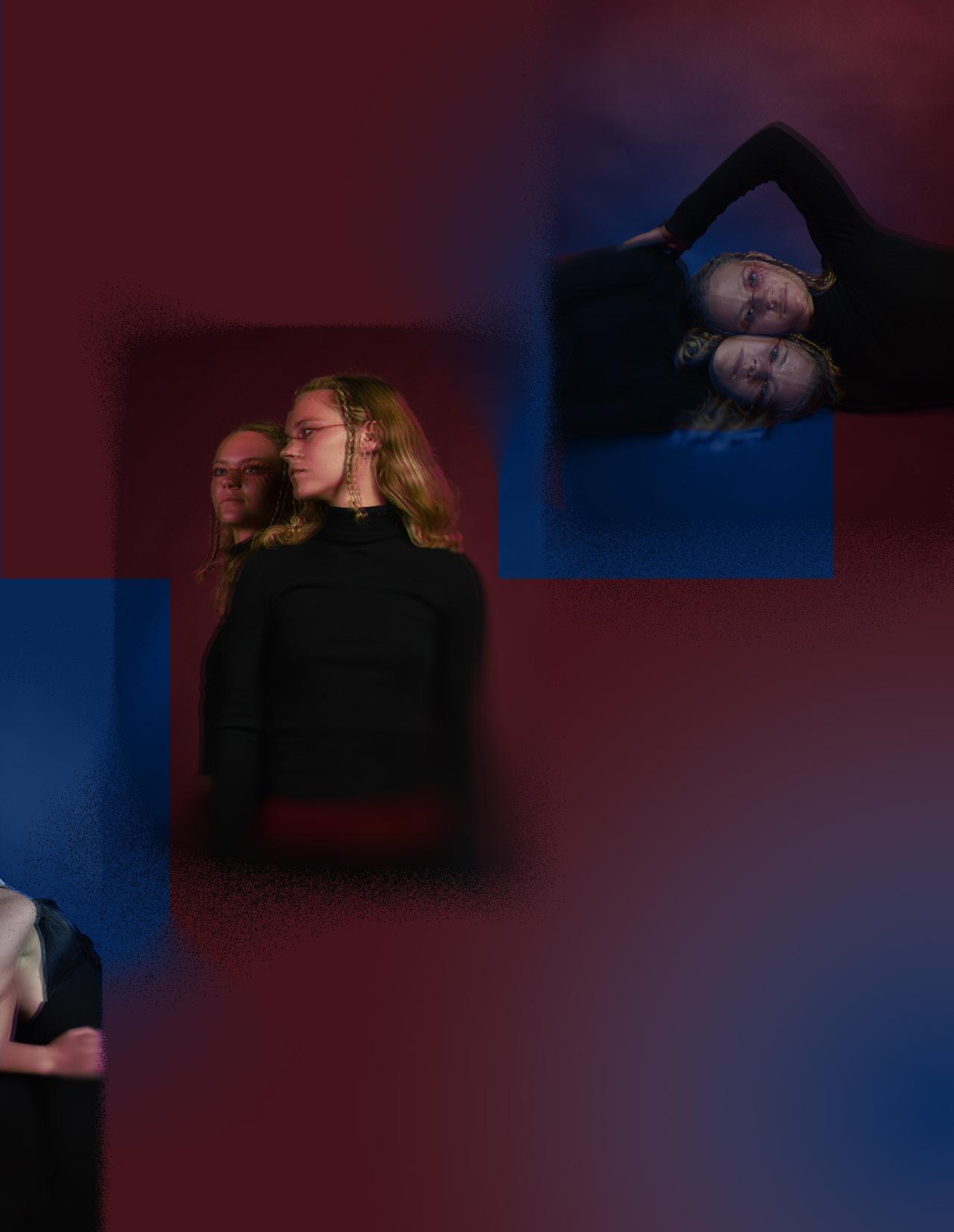

















he Looking Glass is not your average “tale as old as time.” The rest of the team and I became infatuated by the idea of taking a closer look into the reality within reflection, and what happens when the mirror might not give us the truth. In this relationship, we try to make out what remains true and what might be a facade. This is our aim for Issue 07. Although we may never truly know these differences, the opportunity to explore concepts and conventions under our thematic umbrella has been an eye-opening experience for our entire team.
I am so incredibly grateful to work alongside a group of such hard-working, talented, and passionate people. Between our creative and business teams, our community of over 120+ members has come together to create so many incredible initiatives throughout this semester. Being part of this team since the first publication has been such an honor for me, and I hope you love this magazine as much as I do.
I need to give a big thank you to Lily for managing to continue to fulfill her role as Co-EIC during her abroad semester. You are truly one of a kind, and your support this semester has been invaluable.
To my fabulous Exec team: I couldn’t say thank you enough for your support and commitment to creating this beautiful issue. Your dedication to this community is remarkable, and I couldn’t have done this without you all. Thank you, thank you, thank you.
Enjoy ISSUE 07!!!!!!
 Natalie Rubenstein
Natalie Rubenstein




riting this letter from across the globe in Copenhagen is a strange experience. On one hand, I feel so grateful to have been able to stay connected to the Strike community from thousands of miles away and contribute some of my ideas to this fantastic issue. However, it wouldn’t feel right to take credit for the work you’re about to experience in Issue 07.
To my sweet Natalie, it has been so incredible to watch you lead this semester. I so admire your calm yet commanding presence, and you bring such a light and positive energy into the most stressful situations. Working alongside you this past year, I have not only found an amazing co, but a best friend, mother, therapist, and soul mate, and I cannot wait to see the magical things you go on to do.
To the entire exec team, you all inspire me every day with your brilliance, creativity, and tireless work. I am so proud of what you have accomplished this semester, and I miss each and every one of your beautiful faces dearly.
From the conception of Issue 07 to its ultimate execution, “Through the Looking Glass” has existed as a concatenation of our scattered ideals, fears, questions, and fantasies. Inspired by both the literal and metaphorical role of the mirror, this issue explores the simultaneous sameness and opposition that is produced by reflections. We examine the closeness between self-deprecation/self-infatuation, reality/delusion, and replication/distortion. I hope that everyone enjoys flipping through Issue 07 as much as I enjoyed being a part of the creative process!
Sending lots of love from Scandivia!!



editors-in-chief
Lily Pecoriello & Natalie Rubenstein
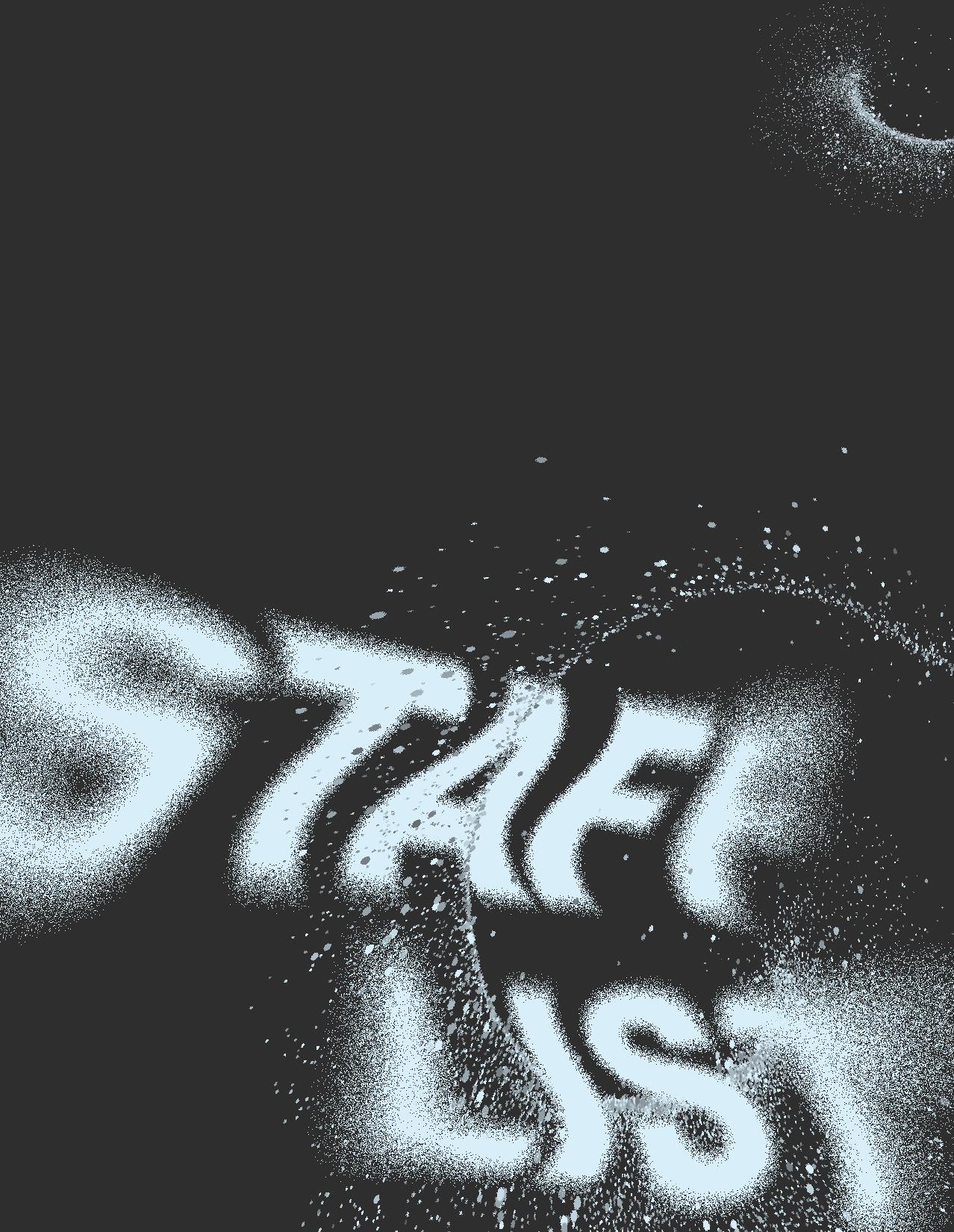
art directors
Christine Jung & Katie Zhu
assistant editor-in-chief
Ange Muyumba
creative director
Sydney Greer
assistant creative director
Peyton Moore
finance & operations directors
Lucie Merkatz & Biddi Solomon Eva Romanoff
pr & events director
Grace
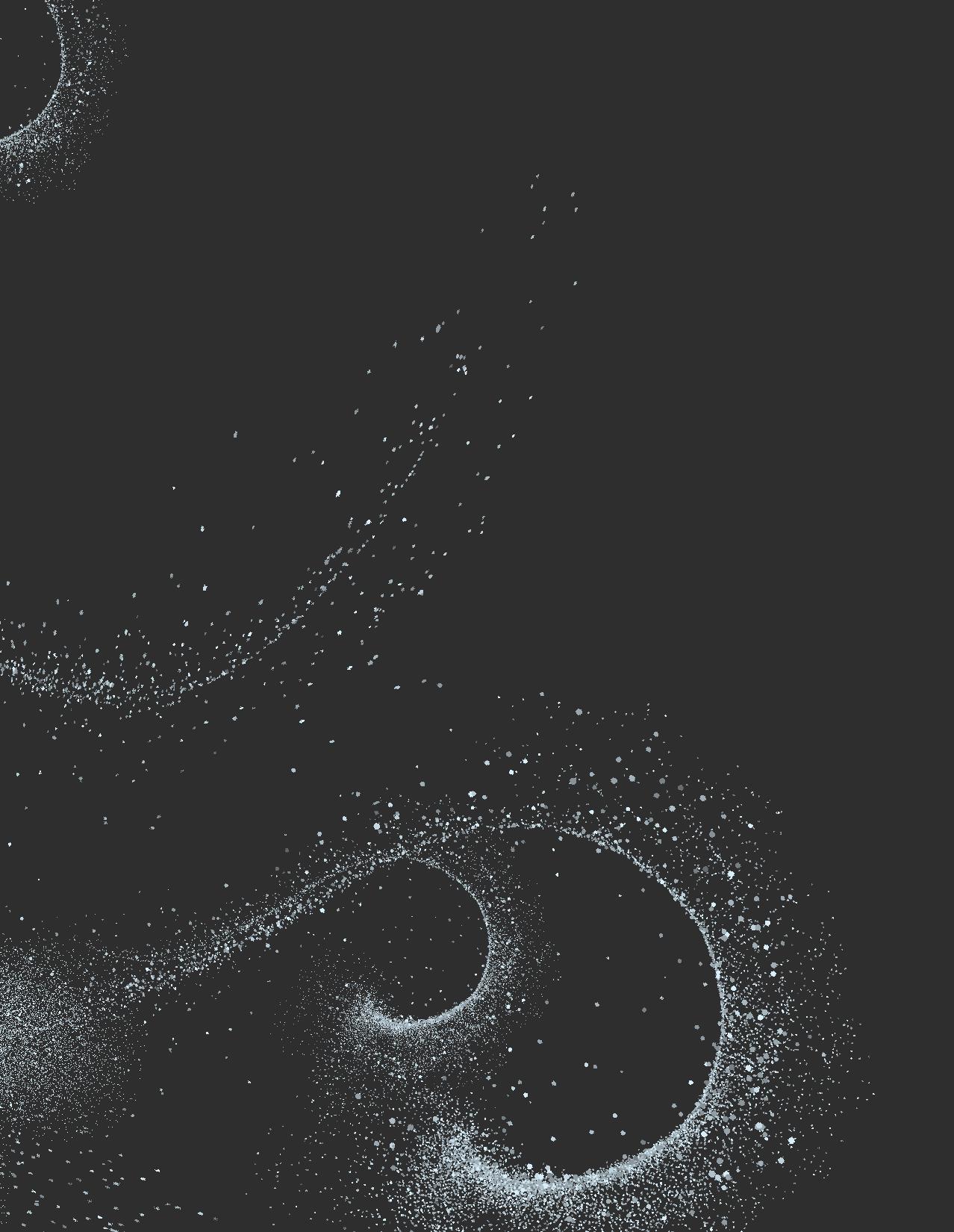
marketing
Magdelene Aideyan
Nora
Lauren
Arianna
Ben Stull
Grace Sugrue
Noé Umaña-Ramos
Zoe Ademuyiwa
Sophie Anderson
Annique Bien-Aime
Ellie Budde
Danielle Cornick
Tenzing Dekyong
Estee Eidinger
Mason Eisner
Emina Kalabic
Hina Kojima
Loren Lacruz
Gisela Liu
Kally Mack
Mia Rubenstein
Maddie Sapra
Anna Zimmermann
finance & operations
Nico Scarpelli
Shira

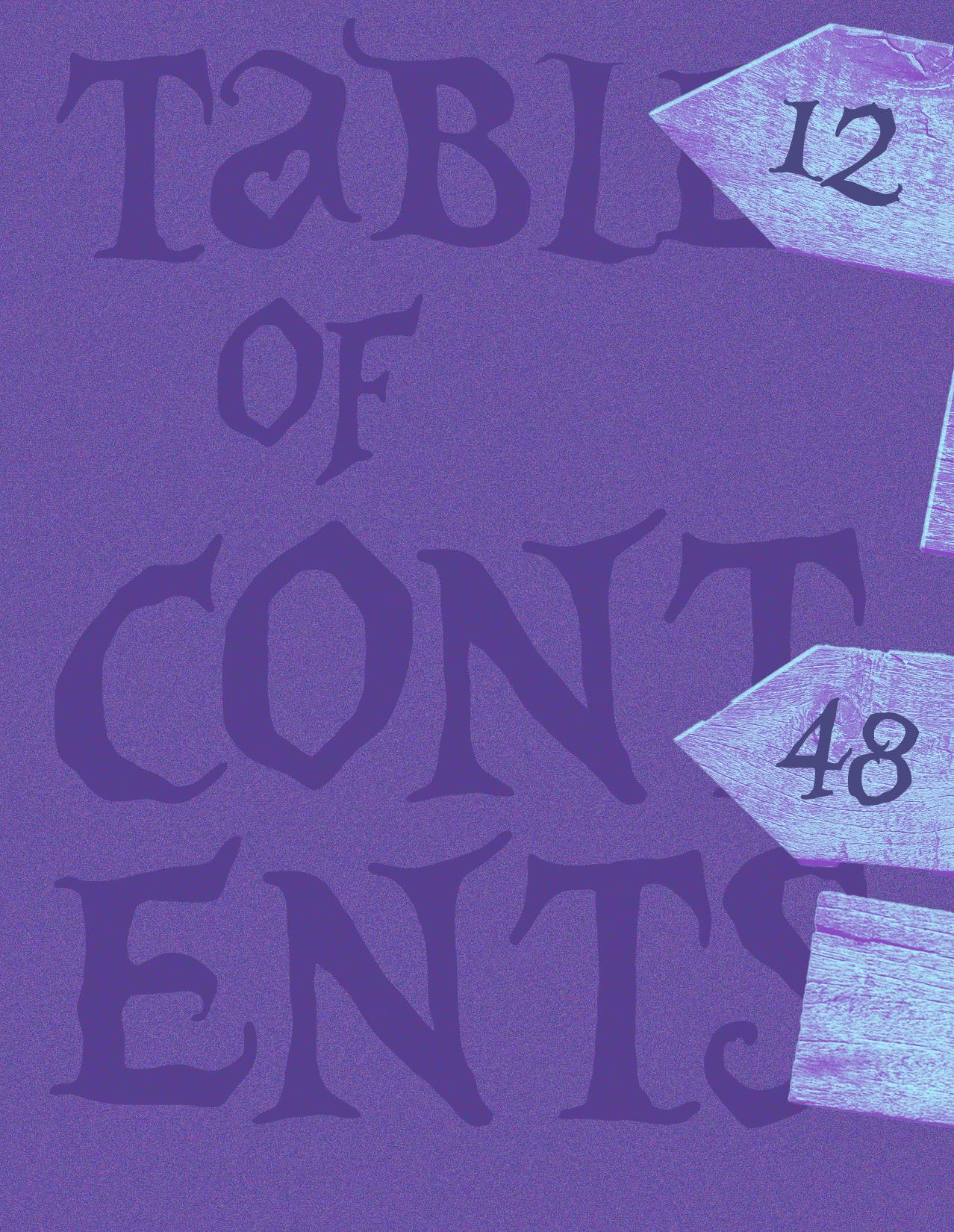
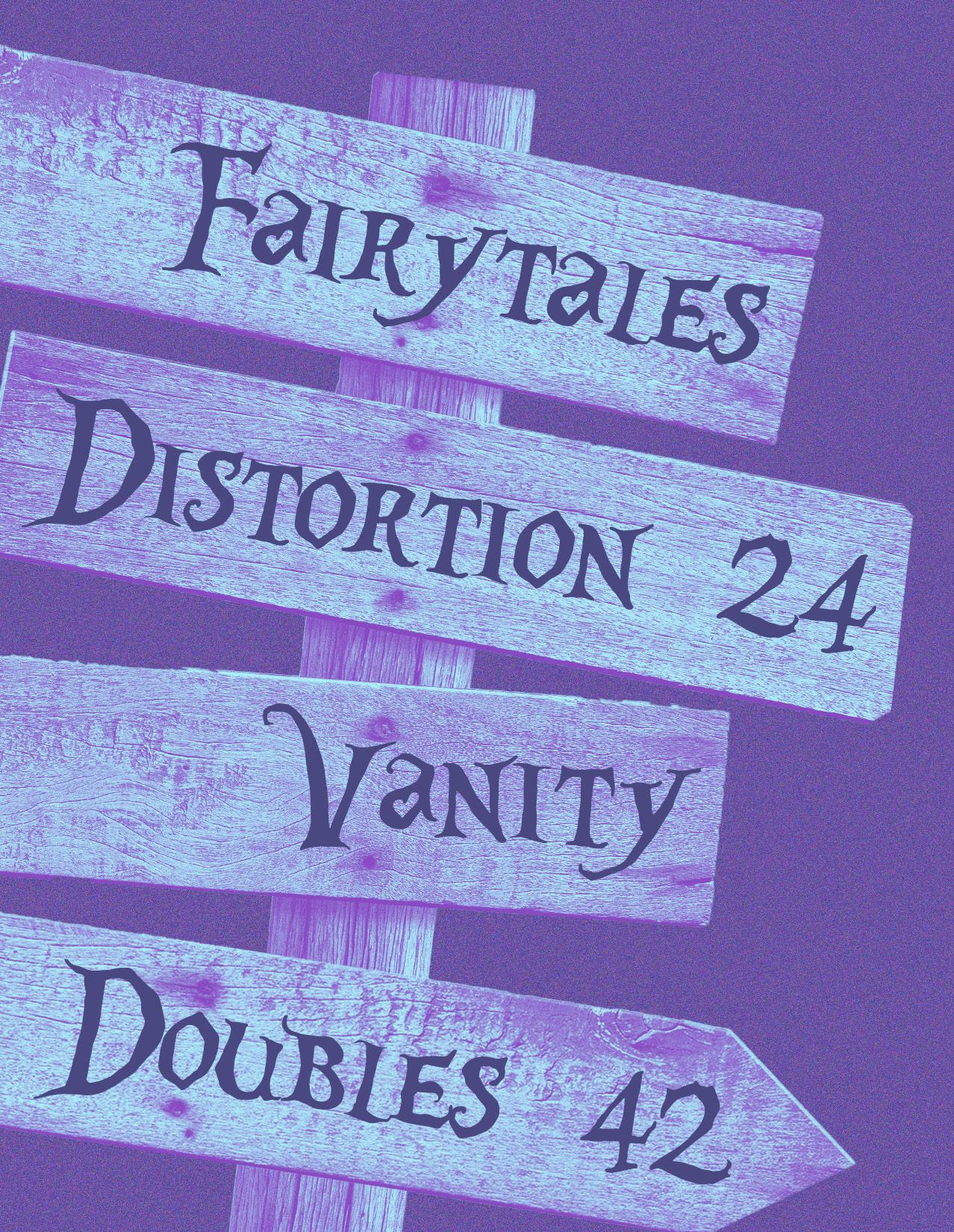


shoot coordinators
Violet Holah
Jane White
featuring Mason Eisner
Sydney Greer
Jenny Rong
Lizzie Wagner
photography
Rose Liu
Laney Price
Zoe Pessin
design
Katie Zhu
writing
Sydney Spiecher
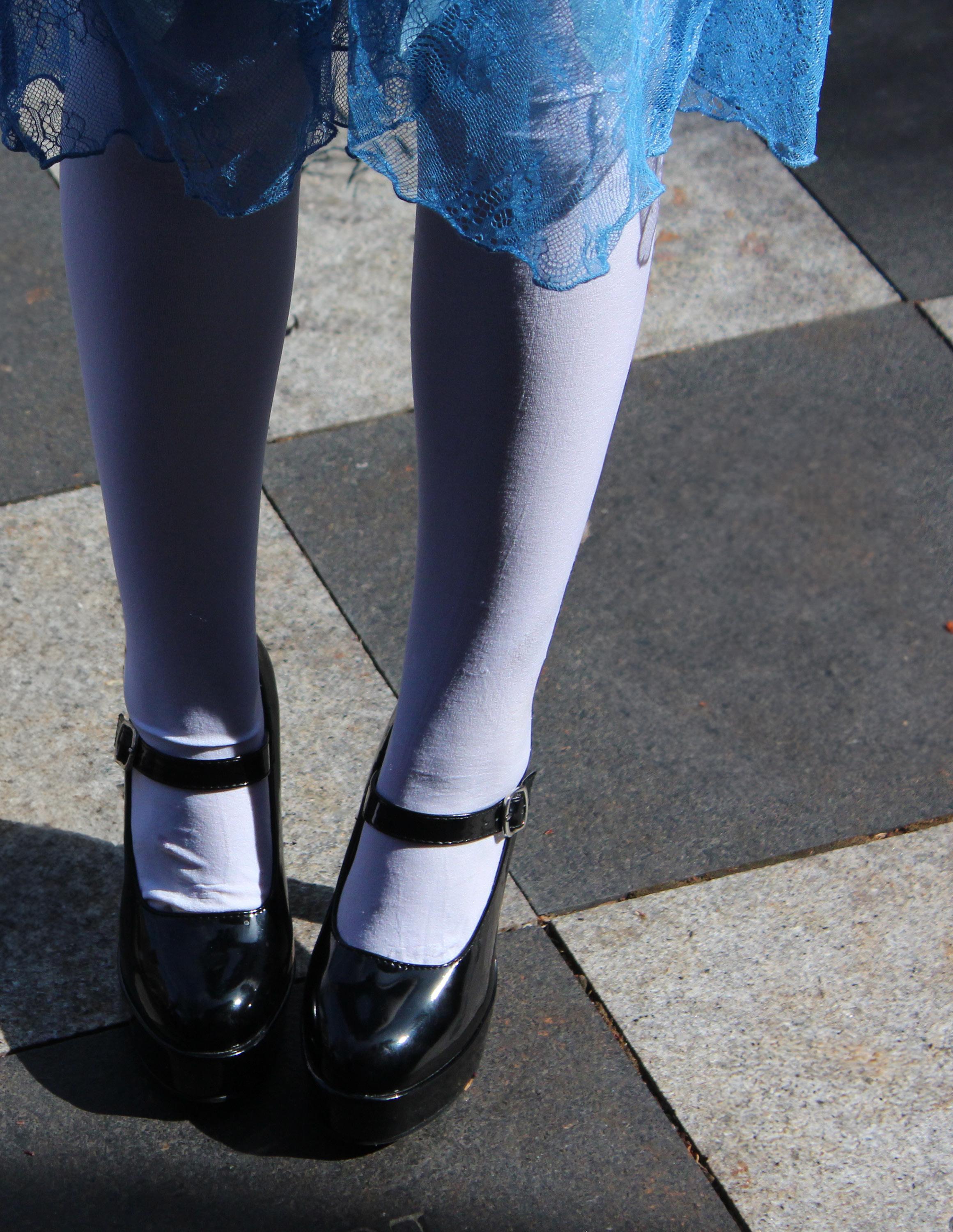
styling
Violet Holah
Eva Horvath
Shira Pinker
Andrew Wang
Jane White
Josie Zimmerman
hair & makeup
Katie Anth
Olivia Slemmer


What a captain! Wendy Pan (ne Darling, la de da) and her poetic tendencies. Tiresome, irksome. Alice would never deign.
Deign, reign! Who needs a crown, anyway? Used to be given at birth (real gold! Emeralds! Sapphires! Ooh, Alice loved the blue sapphires) but now they were invisibly passed around. Celebrities and influencers! Alice was neither. Where were her little cakes? It was time to grow, it was time to focus! Once upon a time: inverted: twice underneath a lateness.
Alice loved to wonder. To wonder… how did she get down here? Ah, the wrong cake. Never mind that! The best way to strategize for chess: to become a chess piece. And who said what she had to be, to do? Look here: Alice, standing in front of a mirror. The certainties: Dress, blue. Hair, blonde. And then the questions: her dresser, cluttered? Her chess set, an old game? She was looking ahead, in front, forward! How could she be seeing behind? Who’s to say—






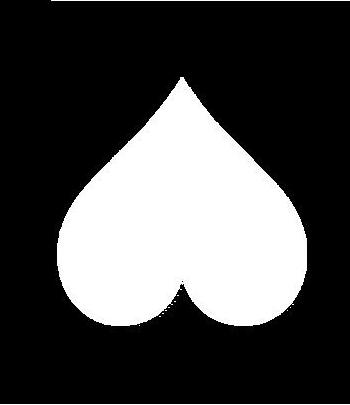
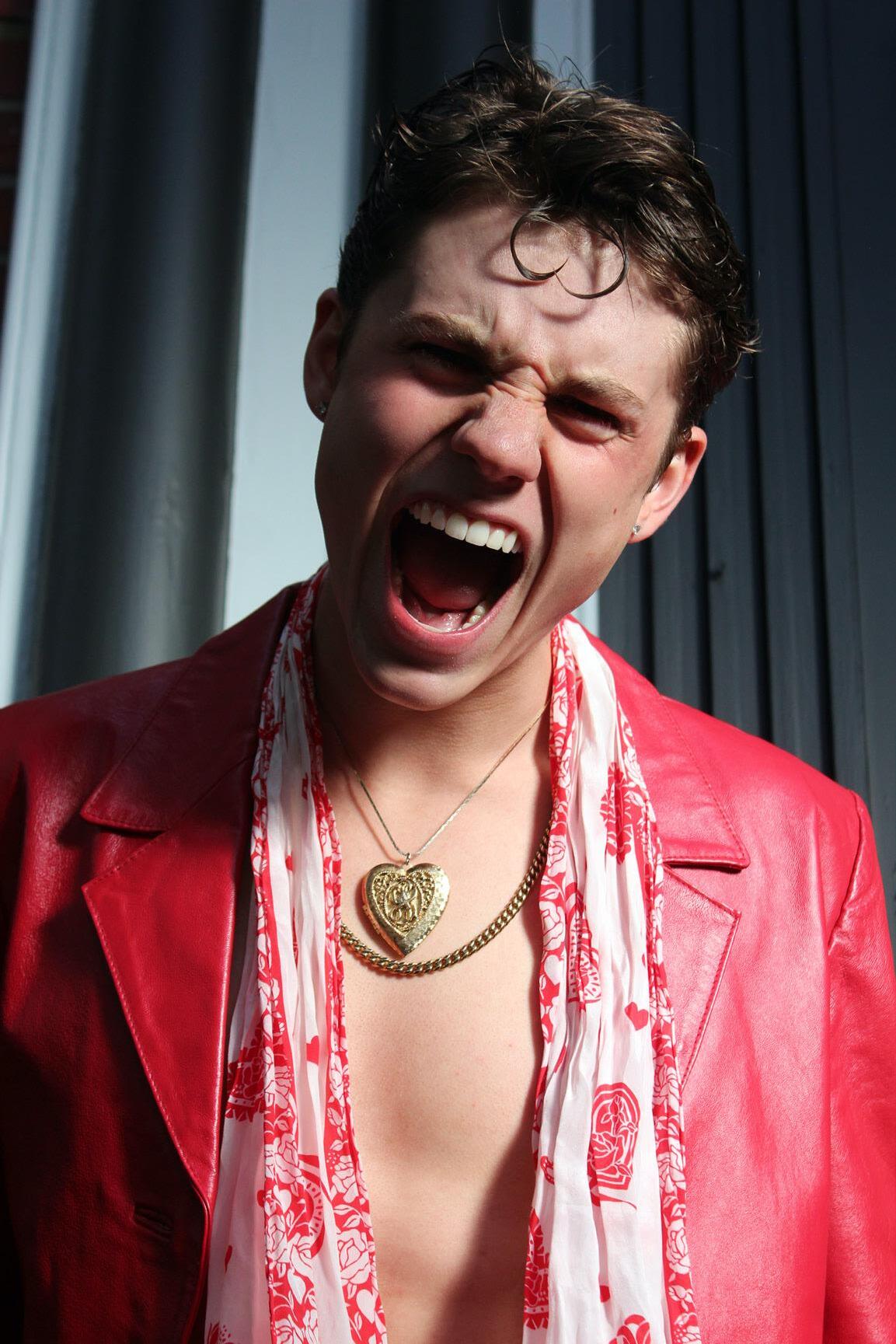
Alice lifts a hand to touch the glass. The visibile! Herself, her dress, her chess. Untouchable! Were they even there? She spins around and sees her phone on her bed. Her phone screen was facing the ceiling—looking almost contemplative. Alice giggles at the thought and greets her tiny companion. Instagram was still open on her phone. Time to see Wendy Pan yet again! Alice navigates to her profile and starts to scroll.
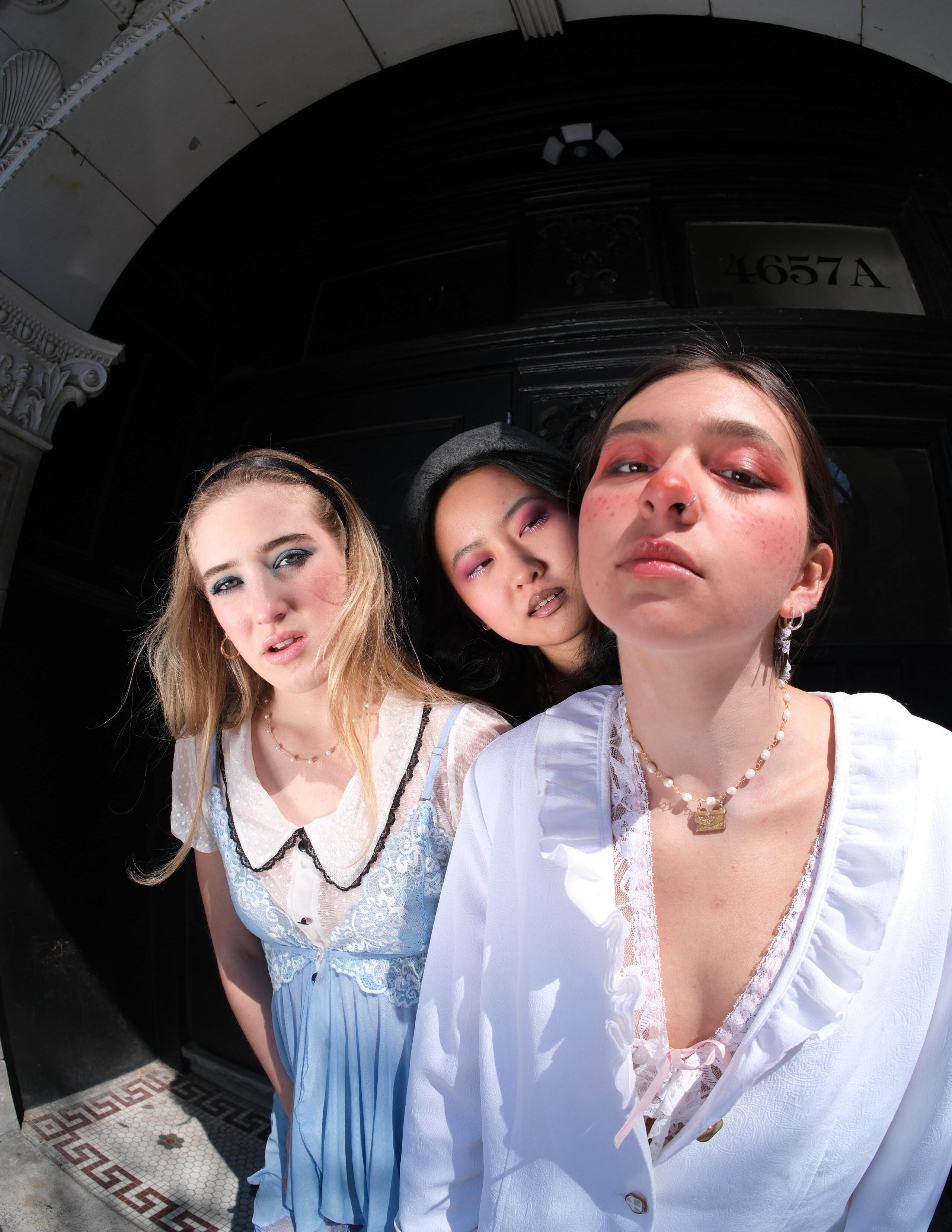


Social media, well, it wasn’t all too different from her mirror. The photograph was just a delayed mirror! A reflection paused; a reflection posted. She could make her bunny look human-sized, her chess board as tall as trees! Did she ever shrink? Did she ever grow? Was she just a photo? Two dimensional? Three dimensional? Frozen there! Distorted here! Oh, Wendy… twice underneath a lateness…
Wendy’s online life looked like a fairytale. A story curated perfectly. Wendy and Peter, in youthful bliss. An Instagramed Neverland! Wendy certainly had a crown, whimsy influencer she was. Alice was giggling and kicking her feet and typing furiously. Falling down a rabbit hole! The caterpillar is smoking and talking in riddles and the purple cat is smiling with his human teeth and the hatter is pouring tea from a flower. Falling down a rabbit hole, indeed! What reels was she watching now? What was real, really?

What was real, really?








In the quiet chapel of my room, I stand facing my reflection. My mirror, a witness to silent confessions.
Tears streaming down my face, I mourn my youth, recounting what once was.
I drape myself in my mother’s robe, Passed down through generations Woven with expectations. Each thread on my skin a sermon on purity, on perfection.
Molded by a history of watching and being watched. Bound to fall short of the reflection I seek to emulate. A cycle of longing, beauty, and decay, hoping one day the glass will shatter.

Writing: Harper Moothart, Illustration: Michaela Sewell, Design: Christine Jung






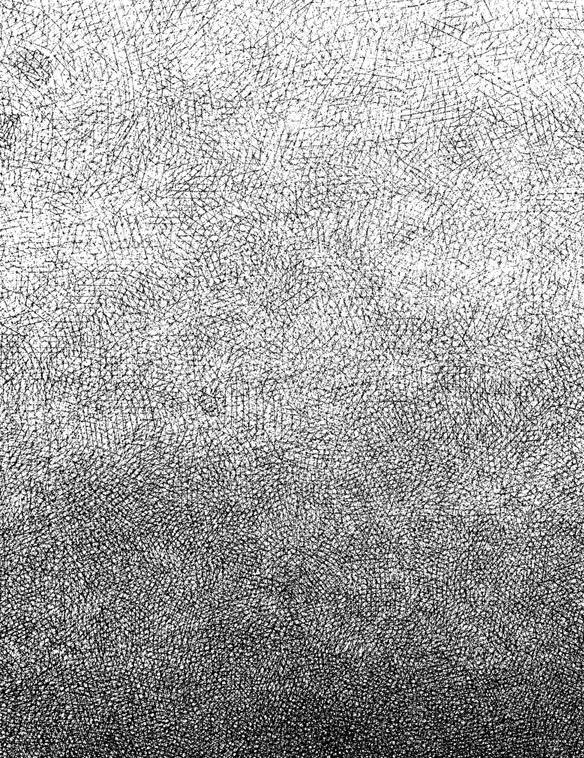
styling
Nicole Brinceno
Griffen Carabet
Arabella Einsmann
Kailey Garcia
Anna Jerdee
Ariana Mejia
Josie Zimmerman
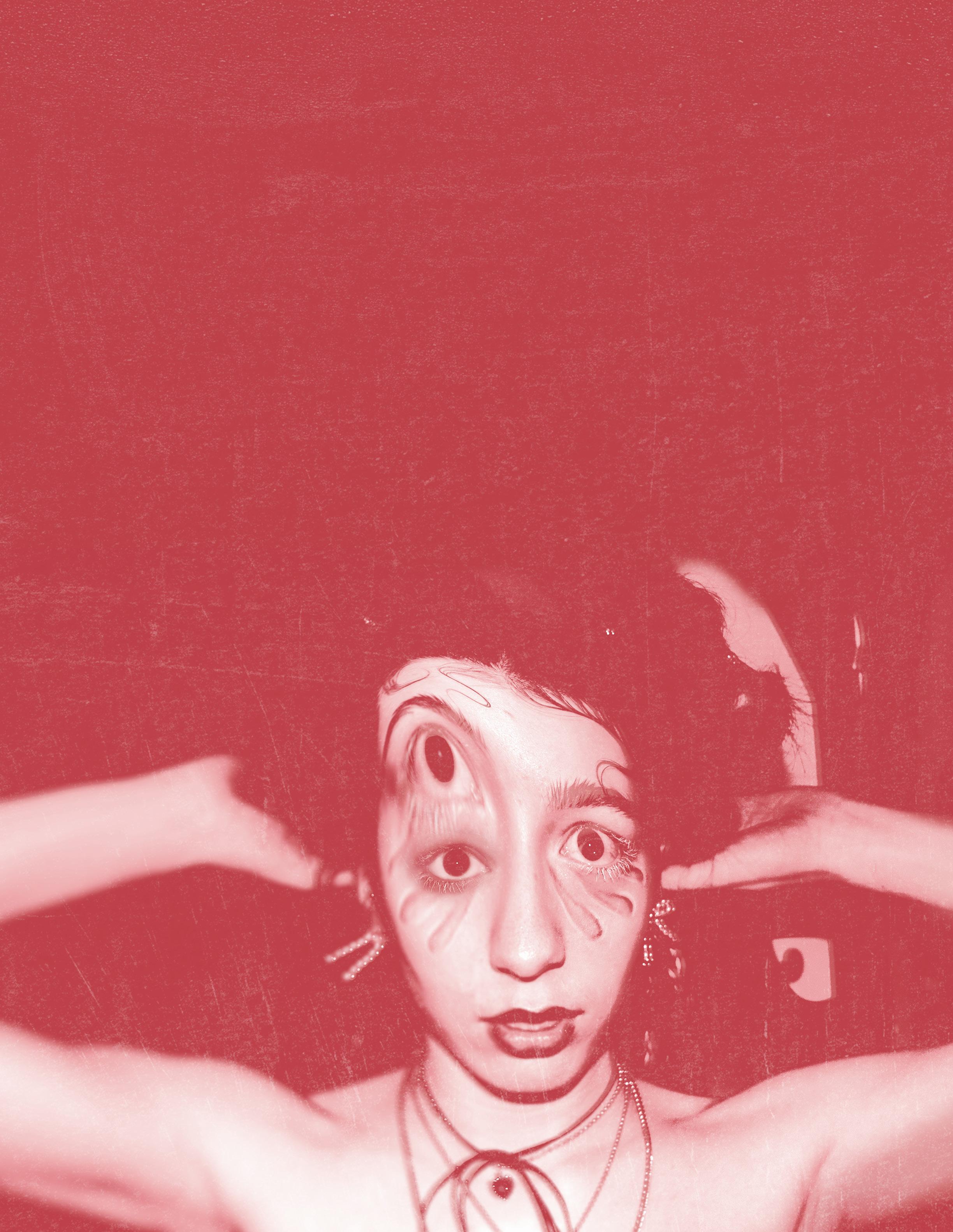
Grace Pindel
Scarlet Reo
Olivia Slemmer
Writing
Katie Holland
Jasmine Najari
Christine Jung
Margo Ogrosky
Madison Wang photography
Violet Deluca
Peyton Moore
Margo Ogrosky

featuring
Ella Dopke
Mia Johnson
Harlem Taylor

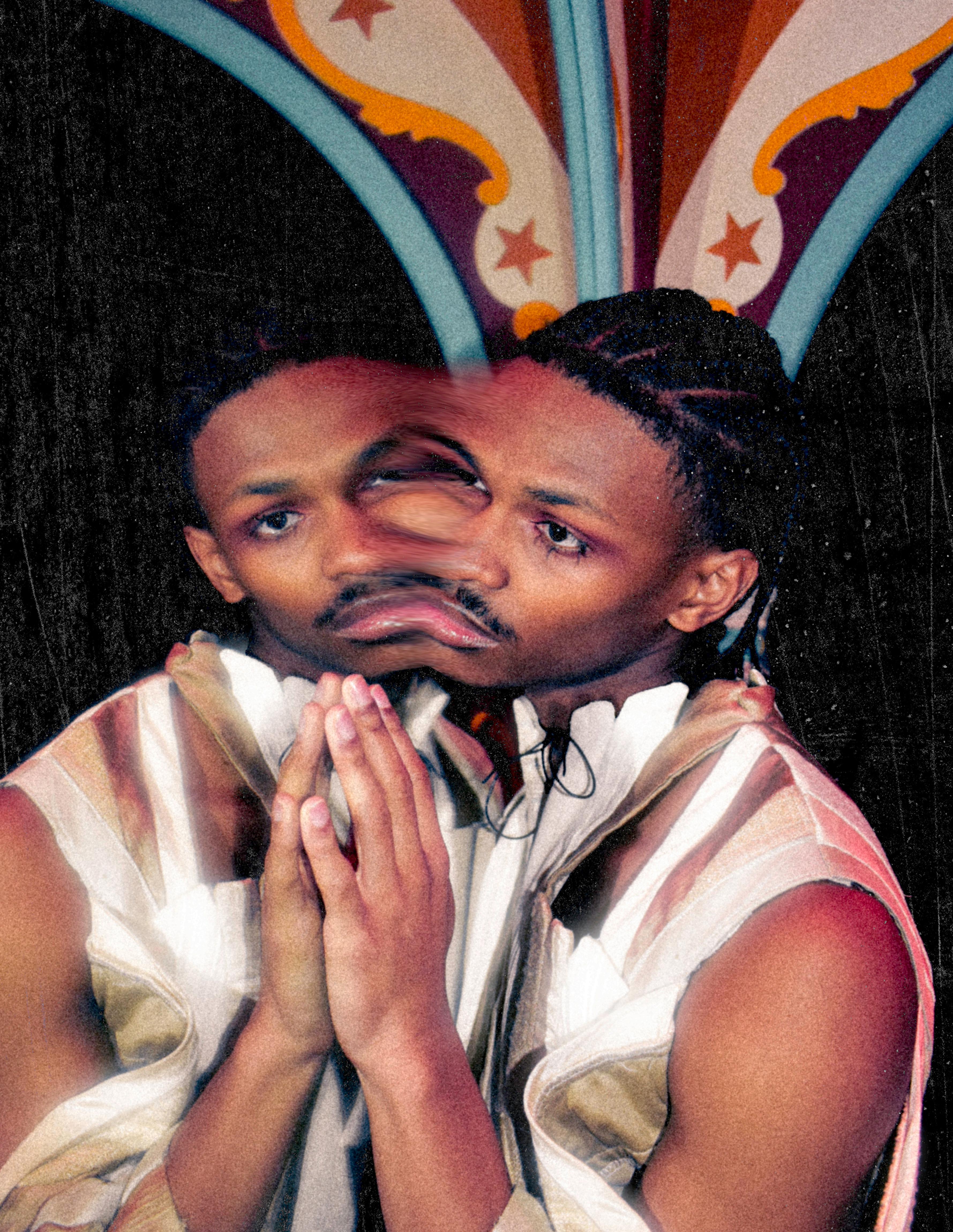
Iwake to the sound of rain dancing on my rooftop. Its steps softly, leaping to the beat of the thunder. The cool tile floor soundlessly carries me to the washroom. I meet myself in the mirror. A pair of cerulean eyes gaze back at their owner. I grimace at the person standing before me, unable to recognize myself. The contours of my face begin to fade, the weight dragging at the corners of my mouth releases. The hollows grow full as light breaks across my face in a smile, erasing the dark smudges that capture my eyes, and the wrinkles of a thousand smiles before.
I watch the color bloom on my cheeks and a rosy tint brighten my lips. A moment passes, and I realize I am standing before my younger self. Back then, I was so naive and so excited to grow up. I pictured myself getting ready for dances with my friends, passing my driver’s test, going to parties, being asked on a date, starting my first job, and all of the freedom that came with being older. But here I am, wishing I could go back to mom picking me up from school, playing outside in ninety-degree summer weather with my neighbors, and not caring if my hair was a tangled mess. I’d give anything to turn back the clock, even if it meant constantly having scraped knees or fights with my siblings. At least we’d still be living under the same roof.



In the mirror’s gaze, I stand, peering into my own eyes. Feeling the sting of someone’s stare burning into my back, I become captivated by what’s unchanging Childhood is novelty. There, I find an azure abyss, a symphony of truth, a wave of lies, a blissful kiss of something, and nothing at the same time. My secrets peek through the shadows, dancing around my hair, clawing at my youth, but just out of reach. I can hear their grating whispers, tickling my cheek as they beckon me to approach. I see my secrets assemble, some bathing in the dim sunlight while others twirl in the mirror’s trance, piercing the veil of shadows.
Slowly, I raise my frail hands to meet the supple palms of my past self and plunge myself into the mirror’s embrace. Quickly, I sense that shadows have wrapped themselves around me, insulating me from the rising voices of my secrets crowding around me as I tumble through the dark abyss. I find my footing on the ground, feeling the electricity of youth coursing through my veins. Suddenly, the bitter cold bites into the backs of my heels, my hands begin to wither, veins begin to hug the once supple palms of my hands, their patterns gnarled like the roots of a tree, and the sunlight from my golden skin reverts to paleness. My eyes flutter open, and I am greeted by the familiar pitter-patter of the storm whirling above me.
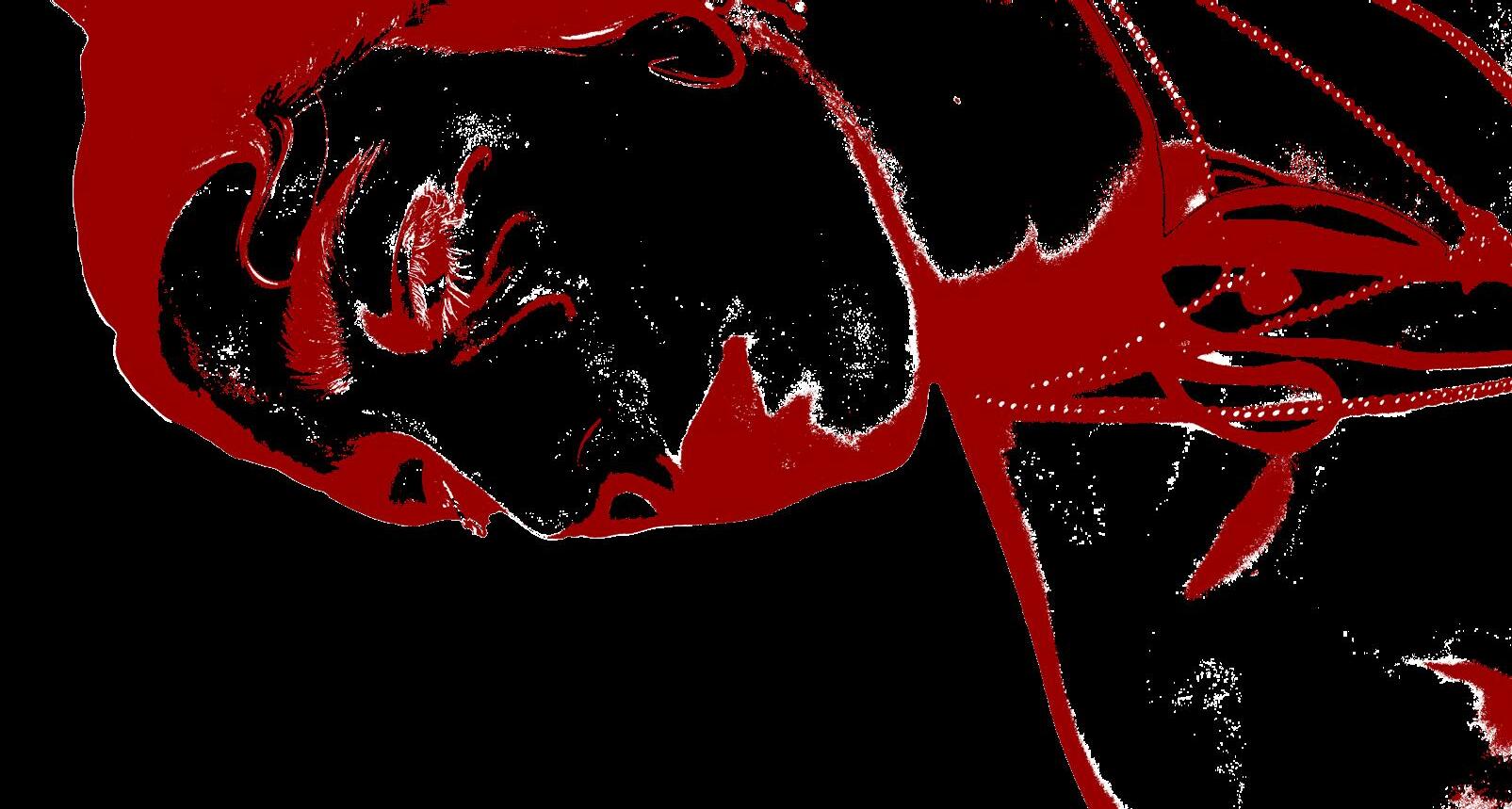






The mirror in the church’s bathroom starts at my eye level and slinks into the methodical yellow tiling strapped across the floor. I want to kneel at the base of it; I want to graze my knees against the aging grout and feel the snagging edges of the girls who sinned before me. I know our collective pain will not swaddle me in the same way I know the West never births the sun.
And yet I begin to lower myself, surrendering my spine so my forehead can press flat to the smudgy soulless glass, skidding my free will across my ugly reflection. With my knees wedged halfway to my cursed navel, I stop to stare. Rounded eyes peer back at me with hidden pupils. Webs of bleached straw form a scorched nest atop someone’s head.
Fuck, I think, it’s you again. I mean me again.
The restraint in my body snaps away in an instant, slamming my knees into piss-stained tile like a spade in April dirt. Violets bloom deep in my legs’ joints, painting my skin, and I wonder if the bruises will make me look even more like myself. I want to stay down, wrapped in my telling legs, for so long that I won’t have to know how much time has slithered past me.
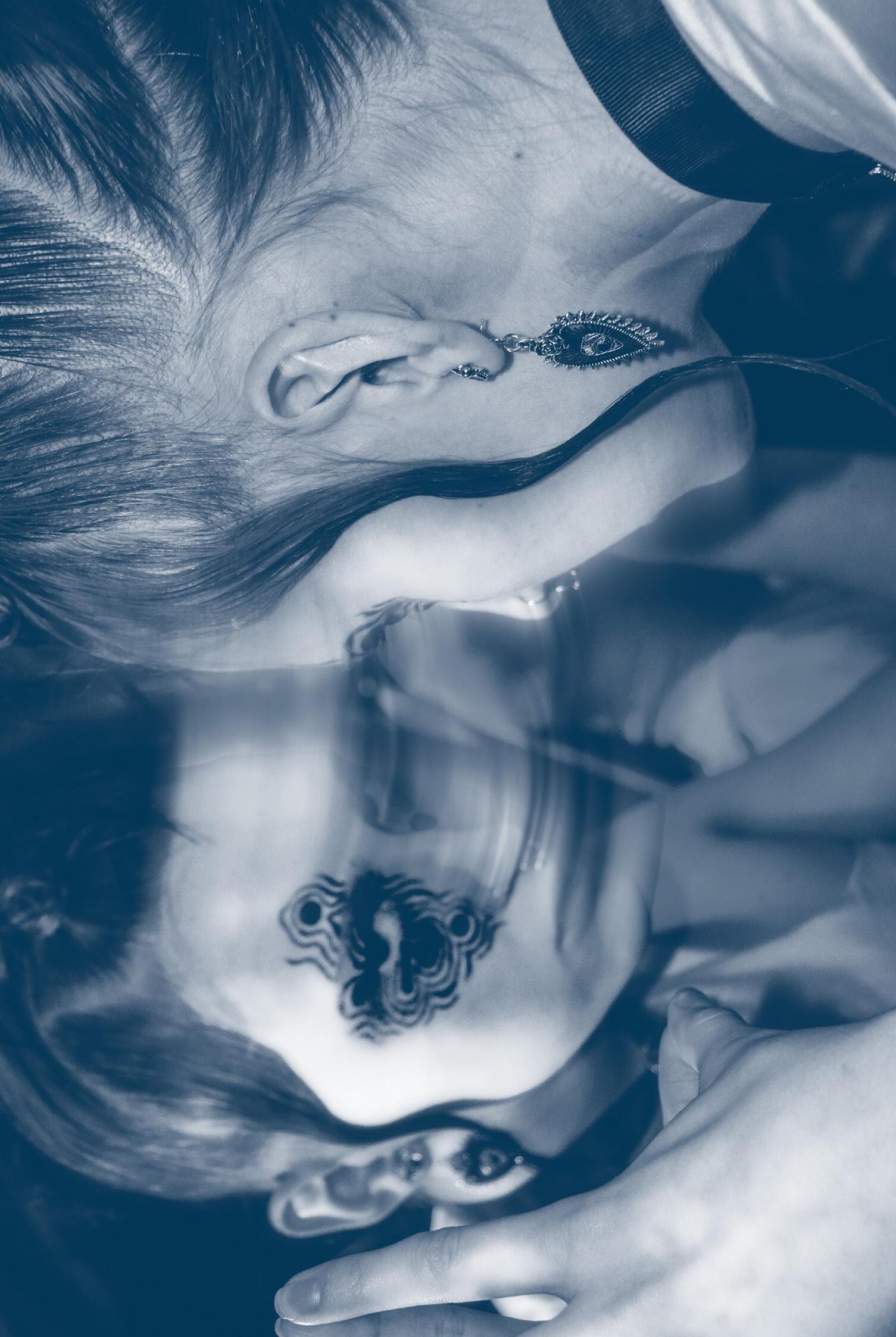
God sent me a chaperone, so I obey. An old woman shuffles in, wrenching you from my frustrated attempts to make sense of us. She plods past me into the bathroom’s singular beige stall. When the lock clicks, I stand up, heading to the sink to let water spill out in a charade of washing my hands. Old people hate when you pretend to go to the bathroom. I go as far as to rip two paper towels from the dispenser for sound effect, using them to pat at the oil deposits sat in the creases of my nostrils. I’m less disgusted looking at the streaks of grease embedded in tan paper than I
I toss the towels in a bin settled at the feet of a statue of the Virgin Mary. All I see when I look at her is her belly rounded not from child but from life. Her flowered crown and pleasant expression could never rob me of my compulsive need to know; I need to know if people called her a slut.
Cain says I only date Simon because of a chronic addiction to pain: the indelible knowledge of my lacking significance to society, the deterioration of my self-worth. Simon tells me I love not for love but for revenge on the ones I no longer devote myself to. I have a compulsive need to be right; Simon informs me that I’m fucking impossible. Delilah thinks I erode every time I expect better.
As perception, inescapable, stabs at the outer corners of my spiraled eyes, a new need encompasses me, forcing me into desperation. I bore into the top of Mary’s bowed head as I beg to know if Mary ever called herself a slut.
The old woman flushes, walking out. I pivot to smile at her, because I understand why God has placed her here: for me to know. Her lips slowly turn up at me while her eyes flit down to my lips, down to the contours of my collarbone, down to my battered, unworthy knees.
Her grin falters. A storm rips a seed from soil, nullifying potential, preserving sameness, upholding my confusion. Cain, Simon, Delilah sneak past my mind into my soul, coloring my actions in their own shades, morphing my intentions with their opinion into an unexplorable distortion of what I thought would make life, my life, worth spending.
I succumb to the mirror when I can not tell who I am: a glass body with a rubber soul, twisted to and by any.
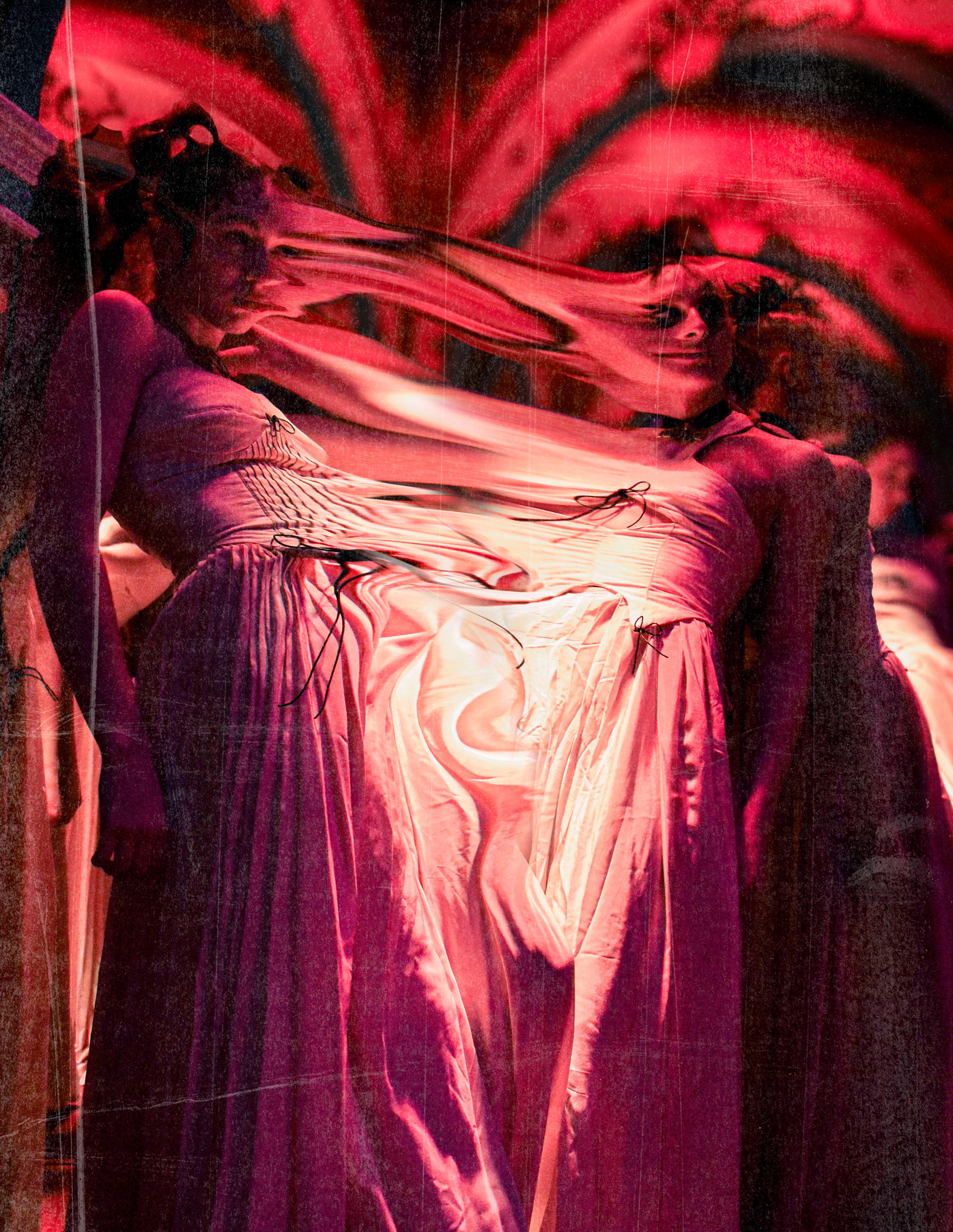 writing by Grace Malley design by Christine Jung & Katie Zhu
writing by Grace Malley design by Christine Jung & Katie Zhu
The Uber driver, who never disclosed his name, decided to go on a tangent. Lucky me. Of all the topics he could have chosen—zoo animals, flying cars, how to cook lasagna, for God’s sake—he preached to me about the power of stocks. While I continued to loudly fiddle with my headphones, he professed that one must have a pair of balls in order to reap the rewards in the cutthroat world of stocks.
“Yes,” “Oh, I see,” “That makes sense,” “Good luck with that,” “Very smart.”
In actuality what I really wanted to say was, “I am actually listening to music right now,” “Sorry, I’m on the phone,” “I’d rather be in silence.” Or maybe even “Shut up!!!”
The tangent, delightfully educational, promptly ended at the Southern Airlines Express curbside bag drop.
Southern Airlines? The logo, clearly a relic of the 1950s, was off-putting. After just 30 seconds squinting at the off-brand impression of a pilots name tag (the one they give little kids when they get to see the cockpit), I realized my newfound personal financial advisor had, in fact, deposited me at the wrong terminal. Southwest Airlines was “the next terminal over.” A different terminal. A DIFFERENT TERMINAL.
You’ve got to be kidding me.
Panic ensued. I am a 20-year-old female. I can do this. I cannot miss another flight. I quickened my pace, rolling my luggage through Terminal 1 with no clear destination, not even sure I was headed in the right direction. My gut told me to turn right. Right I turned. Luckily, after turning the corner, my intuition led me to a help desk whose edges seemed to shimmer with an illuminating halo. Things were looking up. My pulsating chest began to calm.


A faint melody began to play on the overhead speakers. Thunder, Thunder, only happens when it’s rainy, players only love you when they are playing. Bum bum bam! The baggage claim carousels began to spin at four times speed. The luggages, overtaken by a magical spell, flew off the ramps and rose onto their wheels. 50 luggages began to roll their way to me, forming two lines. “Players only love you when they are playing,” the luggages swirled around the bag claim, forming circles, triangles, and pyramids like synchronized swimmers. Flashing lights, red, blue, green, dancing luggages, and fleetwood mac hazed my vision. I chimed in.
The agent, a woman in her mid 30’s wearing a red vest over a white button up, appeared know-ledgeable of the web of terminals consisting of St. Louis Lambert International Airport, casually directed me to “go up these stairs and take a shuttle to Terminal 2.”
Casually. There is nothing casual about this. Stairs, up, shuttle, bus. I have to drive there? I exited the terminal through sliding doors, turning right onto a ramp. The sun glared in my eyes. Fuck. I forgot my sunglasses. On the sidewalk, my eyes darted to a blur of white and
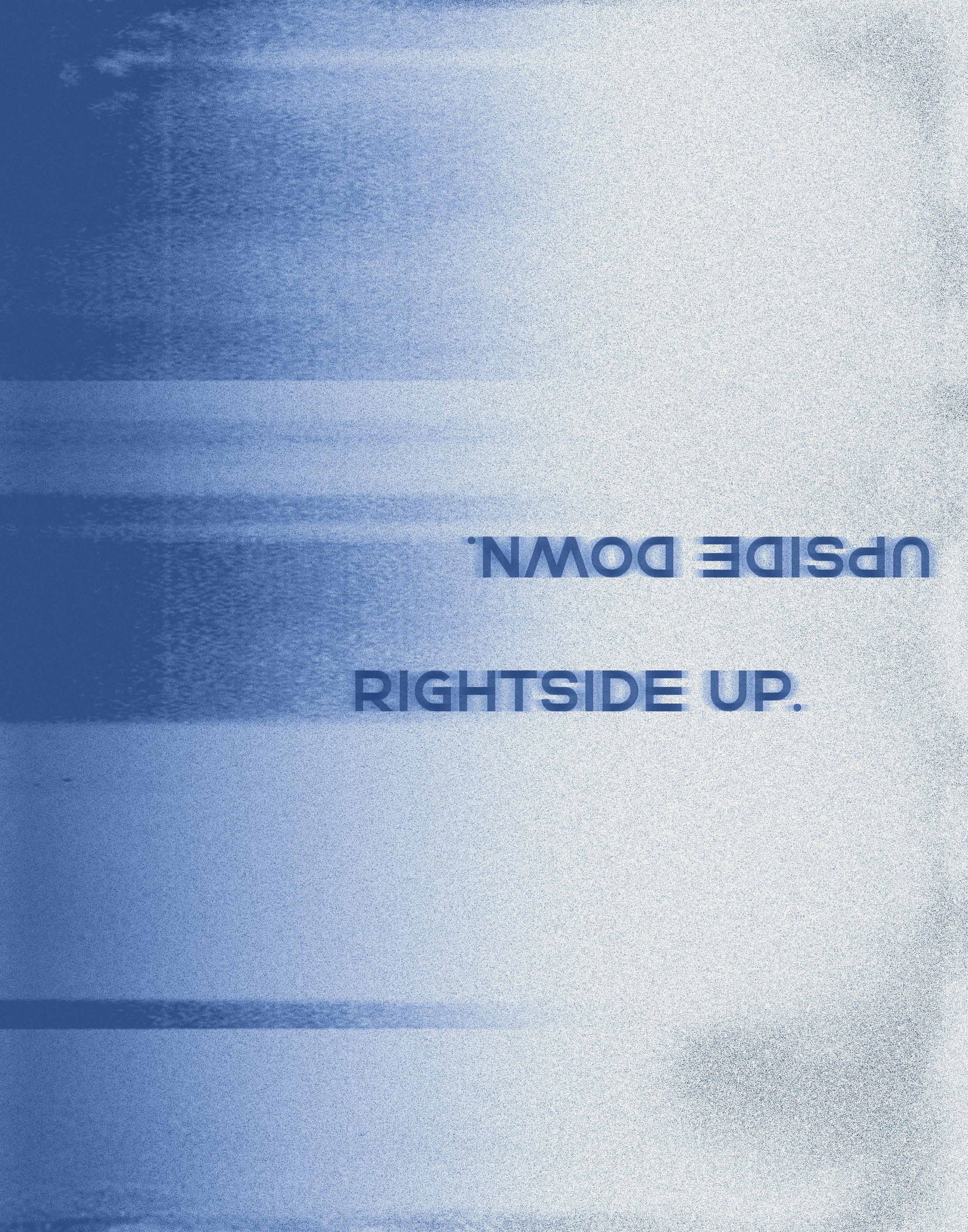
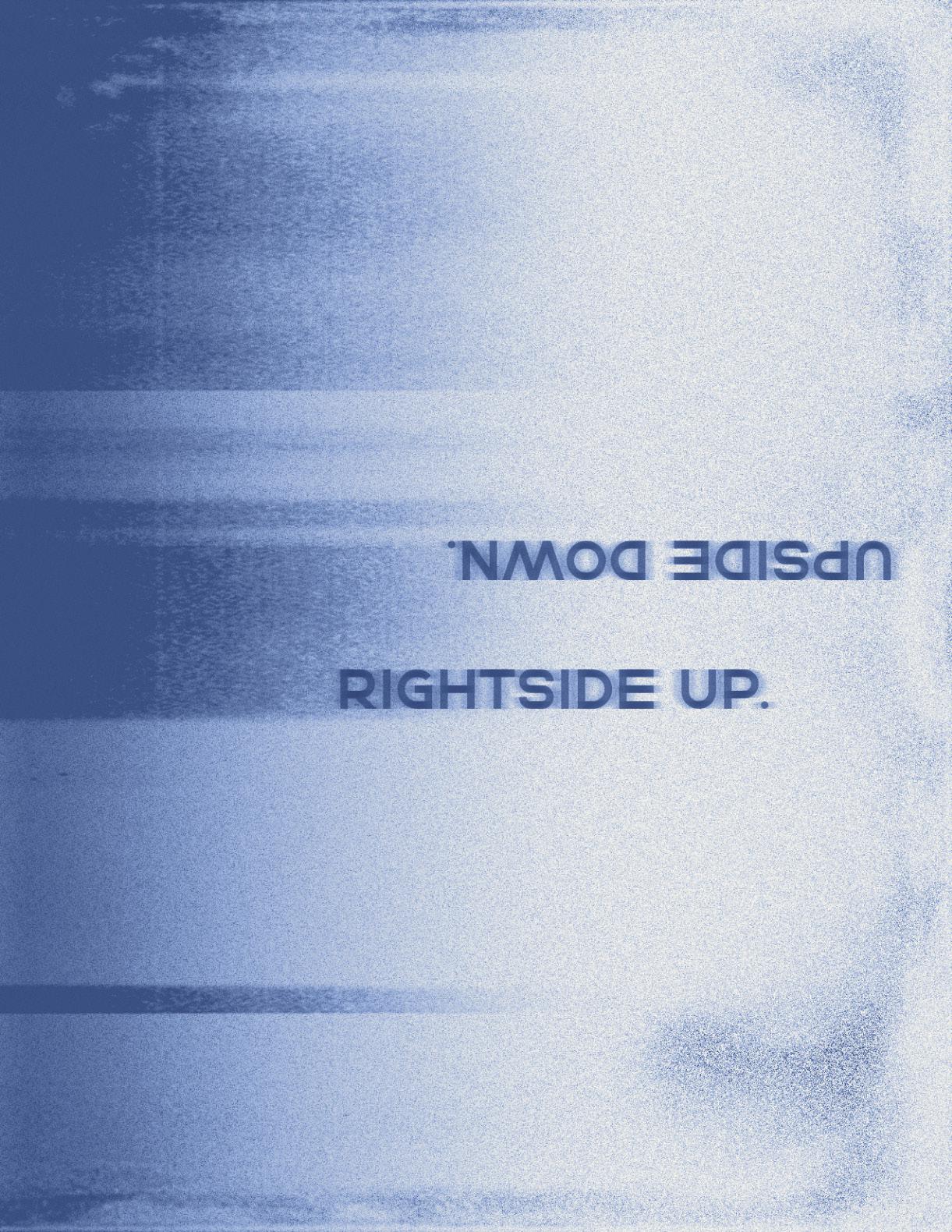
Without inquiring about its destination, I sprinted across the sidewalk lugging my carryon as if it weighed 10 pounds and banged it into a stop sign pole; not even a stop sign can stop me now. I appeared in front of the bus doors, the driver, shocked at my sweaty and panicked presence, opened the door and confirmed the vehicle was headed to terminal 2. “The way you were running, I thought someone was chasing you,” he chuckled.
I laughed (I think). I sat in the seat closest to him. The bus was empty. Great, maybe my tragic morn-ing would finally come to an end. We continued in silence, driving approximately 8 minutes. I watched incredulously as a loose water bottle filled with a mysterious brown liquid splashed back and forth. Rusted luggage racks squeaked after every pothole.
Eventually, we creaked to a stop, the bus doors sighing like an exasperated parent as the tires deflated, lowering us to the ground level. “See you later, alligator,” the driver tipped his hat towards me. “Not for a while, crocodile,” I replied without even thinking about it. I think we’re friends. Or maybe he’s just friendly. The Southwest logo rose in front of me. I had never been happier to see those three stripes. I’d made it.
More importantly, I also made my flight. I wanted to scream right then and there, dance on a table and start a flash mob. Flash mobs have a funny way of creating an exclusive environment. Inherently, they leave out those who weren’t “in on it.” It’s like that scene from Modern Family, where Cam tried so hard to join the flash mob in which Mitchell was partaking. That ended in a marital fight. Maybe I wanted


“All those boarding flight 9807 to Houston welcome aboard and get ready to boogie.” The flight attendant climbed onto her desk, threw off her pink silhouettes into the crowd and started to boogie. In the corner of my eye, a middle aged man squatted on a makeshift bar top. He flung his legs left and right, an Irish jig of sorts, and knocked mimosas and beers to the ground. “Let’s get ready to boogie,” he shouted. I turned to the man standing in front of me in an attempt to confirm the absurdity of the situation. His deep green eyes pierced into my soul, unbothered he said “let’s boogie.” The orderly lines, deformed and every man, woman, and child began. to boogie. A flashmob of sorts.
“What number are you?” a slender, dark haired man of approximately 42 asked. “Oh, I don’t care,”
I responded dryly. In turn, he said, “Oh, but I do.” Of course you do. I was number 54. He was 59. Beat that.
Airports have a funny way of making you vulnerable yet unnoticed at the same time. . I see everyone with their children, their family, their friends, and realize that all these people exist too. What is the obsession with the nuclear family? I supposed it would have been nice to have someone to sit next to, to help with my luggage, to save my seats while I get coffee, or to tell the Uber driver we were at the wrong terminal. But I liked the risk of my seat being taken by someone else. I liked the idea of asking a stranger if I could sit next to them. So,I sat alone, I slept, I broke my nail retrieving my luggage upon arrival. I wandered around for the bathroom, I stood outside wearing headphones (that weren’t playing music), and I waited for a car.
“Welcome to Houston!” the Uber driver said. I replied, “It feels like Ft. Lauderdale.” He comments, “Oh, I’m from Tampa, love having a Floridian around.”


shoot coordinators
Lé-Anne Johnson
Aneesah Rivera-Nichols
photography
Nicole Farnsley
Lé-Anne Johnson
styling
Soobin Ahn
Sydney Demchak
Lela Hartzman
Nina Rosell
Jordan Wolf
Josie Zimmerman
hair & makeup
Saivee Ahuja
Kate Allen-Study
Aneesah Rivera-Nichols
design
Nicole Farnsley
Sofia Huitron
Nissi Yorke
Katie Zhu
writing
Rachel Bai
It’s all about self-love.


Vfeaturing Daniel Du Daysha Hendricks Noor Huda wardrobe sourced by Emily Ortiz @dropdeadvintage__

ear Reader,
Do you have a gift?
Before you reply, we must pause. I want to clarify that I am not asking what you have dedicated sleepless nights to perfecting or what instrument your parents forced you to practice every day after school. I am merely asking what you are good at—what you are talented at.
In response to my question, you may have thought to yourself that you are wonderful at art, fashion, sports, mathematics, or literature. Or maybe you hold the prestigious title of the most successful blower of Hubba Bubba out of all of your friends?
Or you’re your town’s best soap carver? Perhaps you can replicate the sound of a cow so realistically—the moo— that you’ve gone viral online for posting a video of yourself doing so?
Before I lose you, I want to ask you just one more question: What makes you gifted?
Is it ambition? Strength? Gratitude or perhaps hard work? No. The reality is that you must have been born with your gift—given by genetics or whatever other higher power suits you. (After all, that’s why it’s called a “gift”.) So that means, unfortunately for mediocre, old you, you may not be talented at anything.
The first time I realized my talent, my gift, was when I was nine years old. We were sitting circle-round on the grass during recess.

Doyou have a gift?


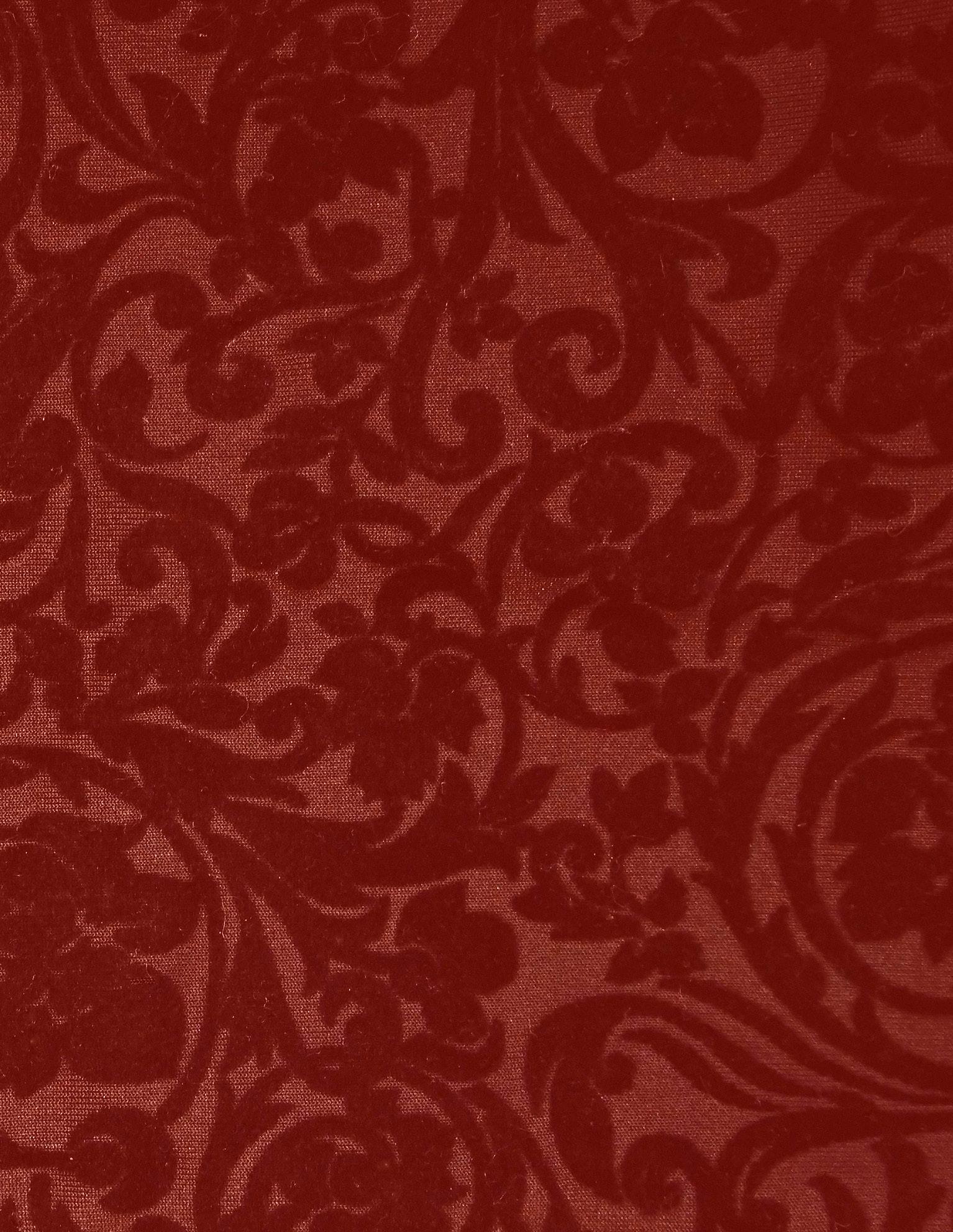
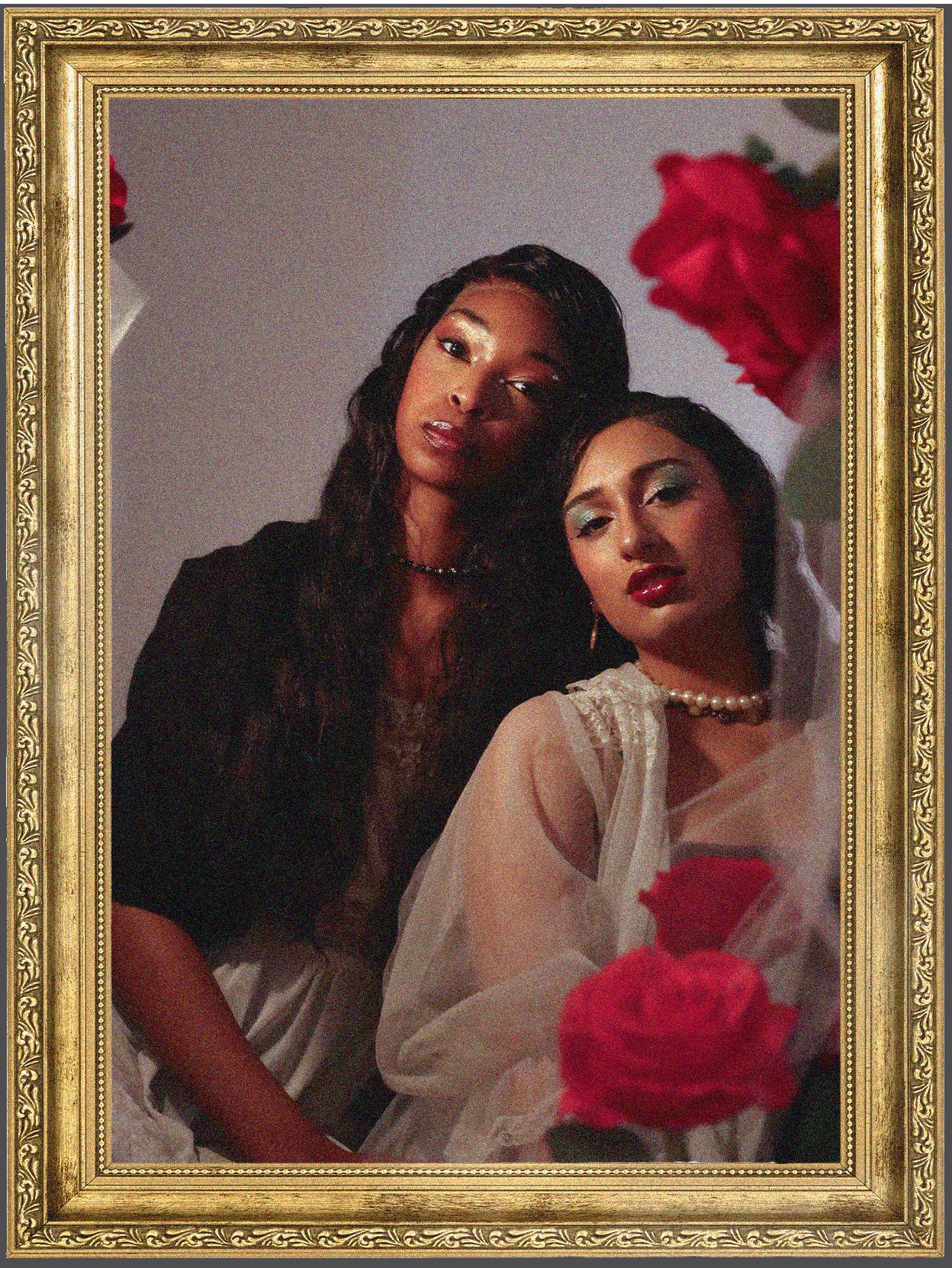

You ’re the

“I’d kiss Alex,” Jamie finally said after a few moments of squinted-eye deliberation and, after another second, blurted, “and I’d kill Carmen.” Carmen’s eyes darted to the ground, her cheeks flushing pink.
“Where does that put me then?” I asked. It was my first time playing this game.
“I’d marry you then. It’s the only option left,” Jamie replied, picking a booger out of his nose in the process.
“But why?” I was still confused. Jamie shrugged. “I dunno. You’re the prettiest.”
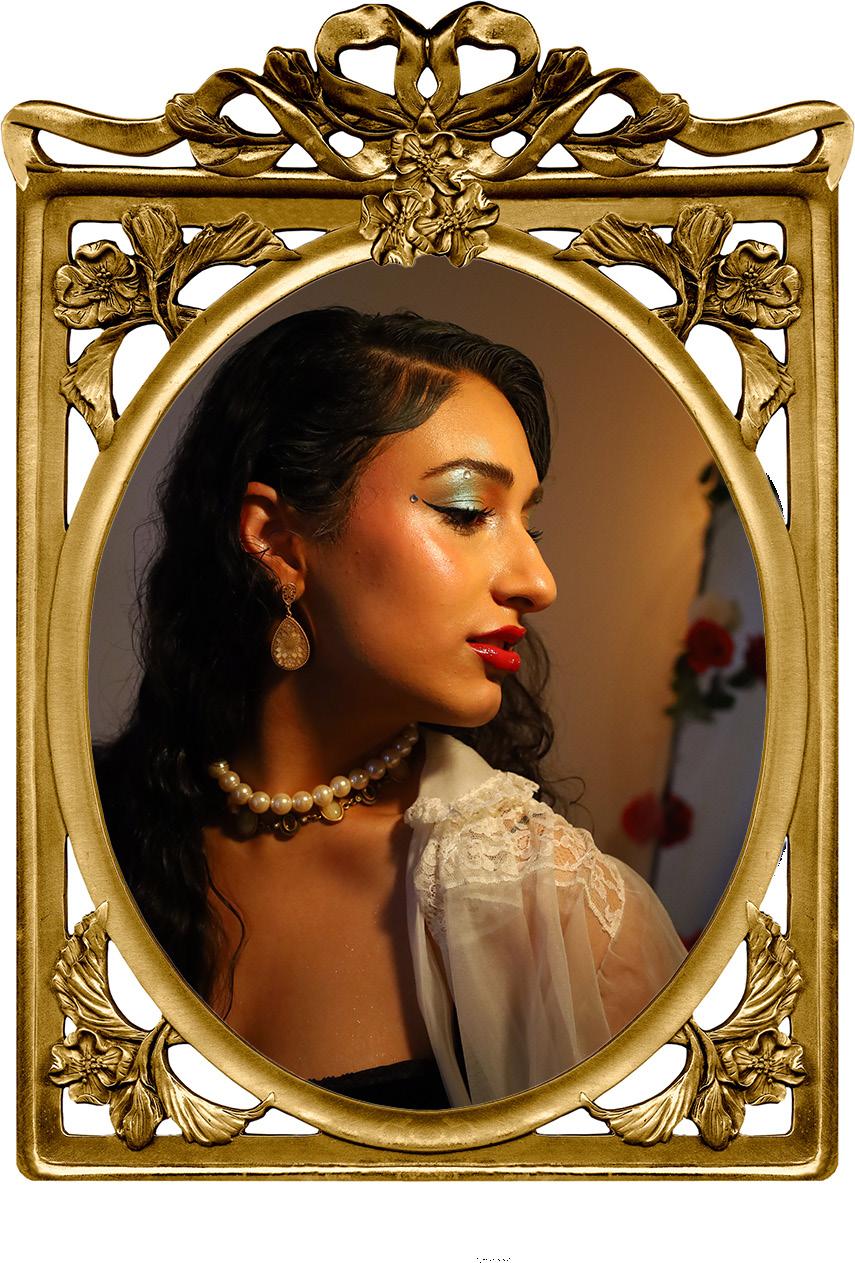
She laughed for a second before answering like it was a stupid question. “Sweetie, of course I think you’re pretty. You are the most beautiful person in the world.” She tucked a strand of hair behind my ear. “Do you think I’m pretty?” she asked, returning my question.
I didn’t even hesitate. “Yes.”
It was the obvious truth. Everyone loved her. Boys in my class would make dirty jokes about her breasts and whisper to each other that they’d “totally do” her when they thought I was out of earshot. Strangers we met at restaurants and on vacation would look her in the eyes, enthusiastically nodding, though they failed to register a single word she said. My father bought her bouquets bigger than a car tire every week without fail. Even after he found out about her affair.
“Well, if you think I’m pretty, then you are also pretty. I’m your mother, and you have my blood.”
That night, when my mother tucked me into bed, I asked her: “Mom, do you think I’m pretty?”
Mom, do you I’mthinkpretty?

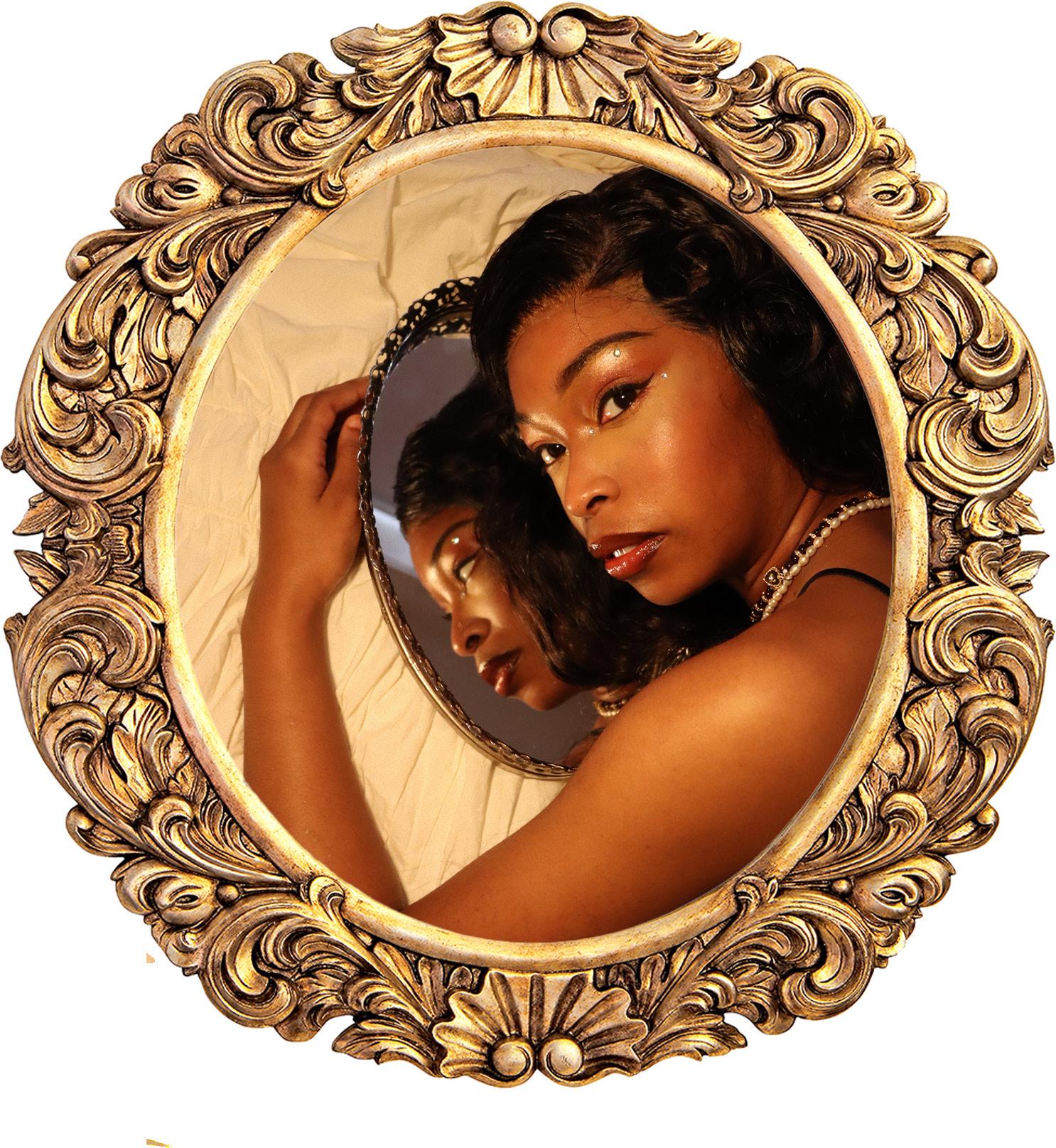
It wasn’t long until people started treating me the same way. So, I decided not to go to college after high school graduation. I mean, it’s only a matter of time before I hear back about the modeling portfolio I submitted.
There are a lot of things I despise: the smell of wet dog, greasy food, crooked noses, greasy skin, greasy hair, unpainted toenails, and unmoisturized elbows…. The list goes on and on. Above all, though, I hate desperation.
Which is precisely why I could not go to college. In high school, I was tirelessly sought out by my desperate peers who wanted to befriend me. Their questions were endless. Do you want to come to my party? Do you want to sit with us at lunch? Do you want to meet up after school? The worst was when they would ask: Do you want to go out with me? At first, it would take everything in me not to laugh, but over time, their requests became increasingly offensive.
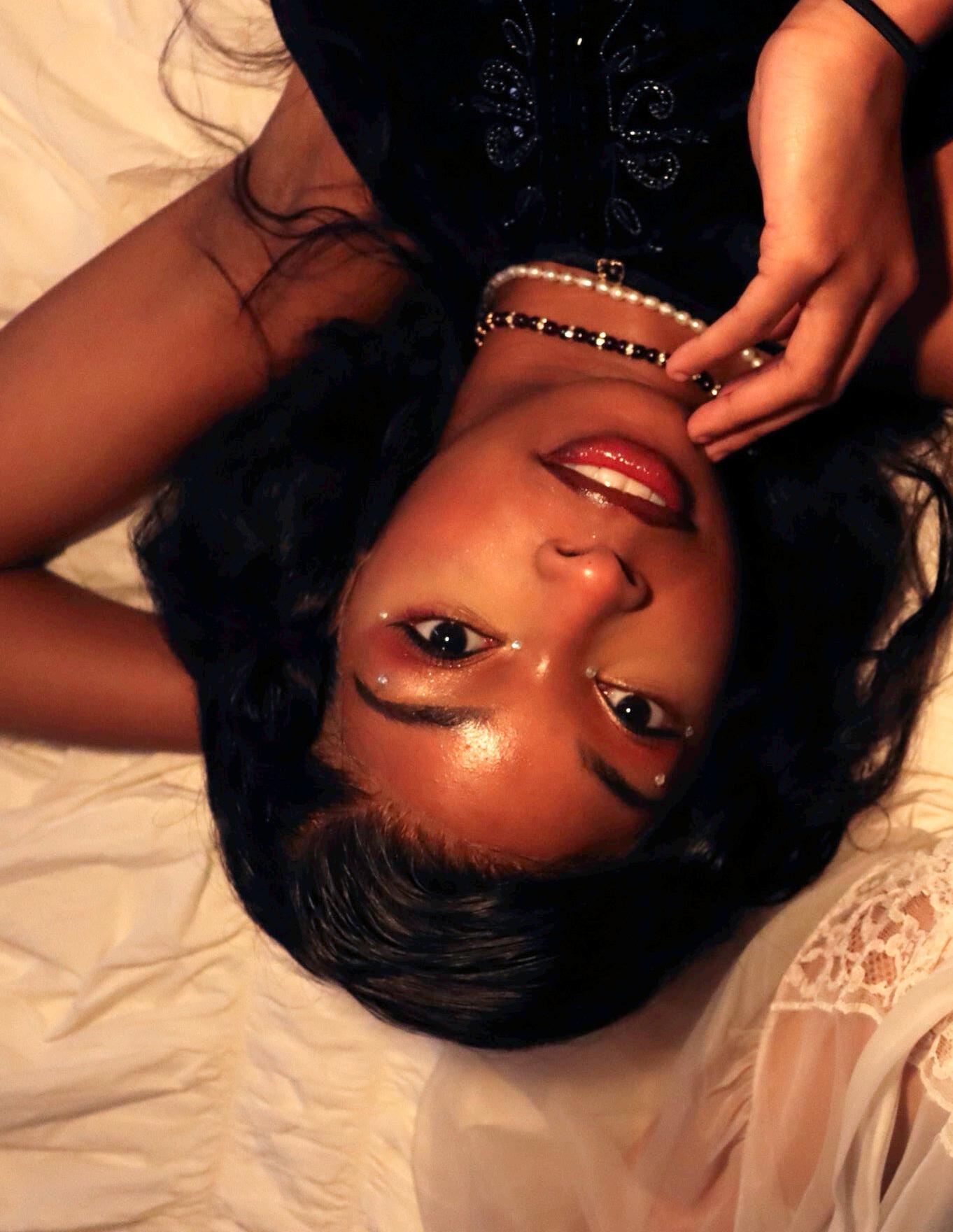
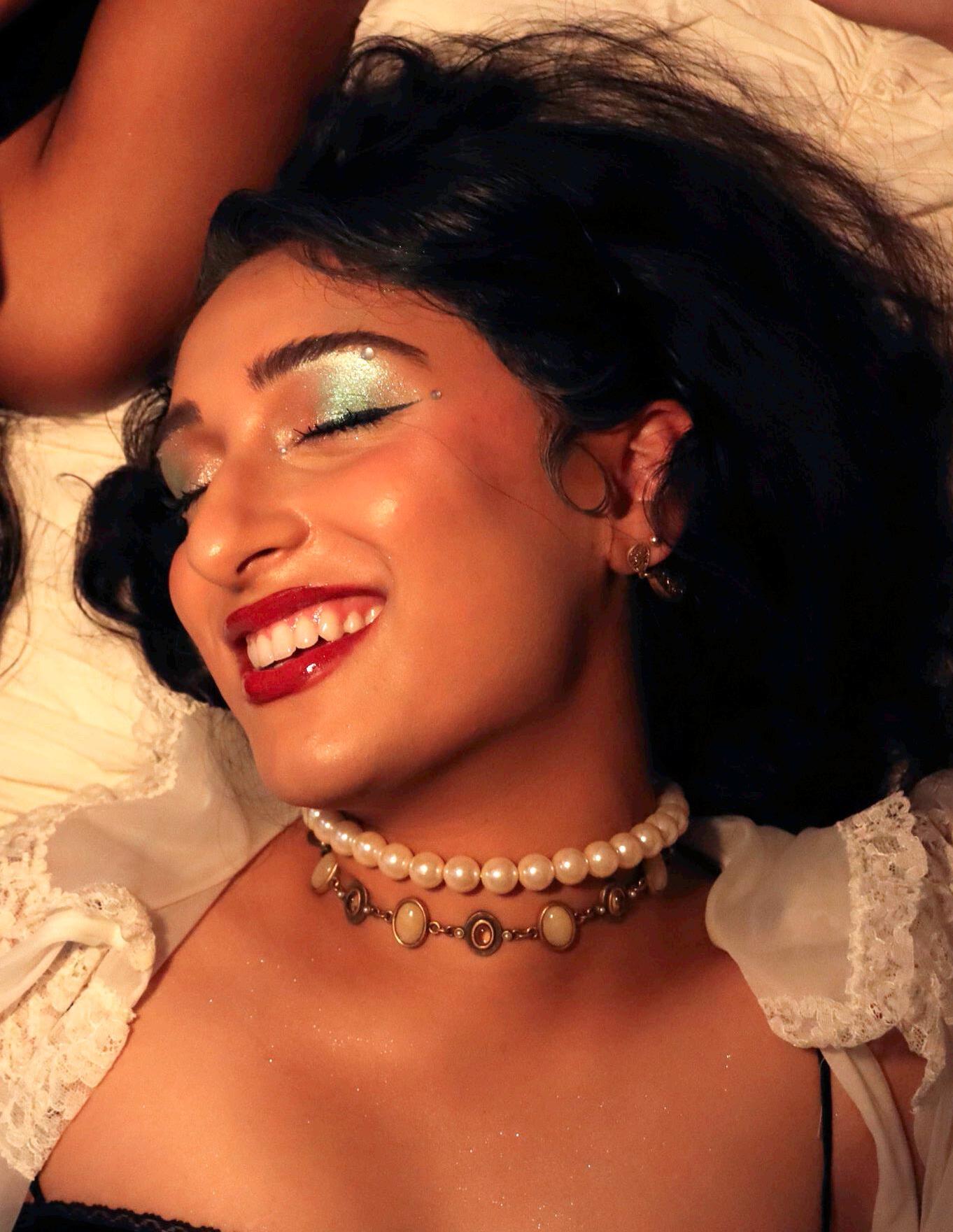

I truly gave it my best effort
not to cringe as they would ask me pathetic questions like these, the pimples on their cheeks rising as they would smile, revealing their yellow-stained teeth through their chapped, thin lips. The worst is when they’d have those unplucked, stray eyebrow hairs sitting above their hopeful eyes like an array of an old man’s dirty pubes.
It was all too unhygienic for someone like me to handle, I couldn’t go through it again in college. I’m sure that some of you will understand. But if you’re reading this with a face of horror, shocked at the honesty—or people like you may refer to it as the vanity—of my words, I urge you to take a look in the mirror. I don’t need you to agree with me, just to know that when you’re born with a gift as special and authentic as mine, the truth becomes obvious: Not everyone is beautiful, and most people don’t even come close to fitting the description. So call me vain and conceited, but if you feel the need to do so, just know that you—my dear reader—land in the category of people on this planet who are simply not beautiful.

And for that, I pity you.

With love,

My home is a sphere of glass, Inside, light spins and shadows morph, Where reflections are magnified and visions distorted, In the prism’s grip, all perceptions contorted.
My existence is limited to rhythmic strokes, Every move is observed, scrutinized by the curious eye, In this dance, I am both the performer and the pried.
Amidst this void, there’s echoes of once was mine, Of what was once yours, of what was once ours, It all stretches before me; the reminders of old times.
I want to reach the world beyond, the world beyond laws and rules. I want to reach the world beyond, the world beyond myself.
For here they offer me to society, distorted and disfigured. And keep my freedom locked away. I yearn to reach the world beyond these walls Beyond norms and confines; my freedom, it calls.
In my fishbowl I sit, I stare, and I ponder In my sphere of glass, I find myself ensnared. In the echoes of yearning, there’s whispers of plea, In the prism’s silence, there’s a captive, yet free.
 layout by Ella Dopke, design by Christine Jung
layout by Ella Dopke, design by Christine Jung

s ours yours yours sruoy mine mine
s yours yours yours mine mine enim im
ine mine mine mine mine mine mine ours ours ours ours ours sruo sruo sruo sruo ours ours oursours yours yours yours yours sruoy sruoy y
ine mine mineminemine mine mine ours ours ours oursoursours ours ours ours
i
m ine mine mine a captive, yet free ours ours sruo
s ours ours oursours ours ours yours yoursyoursyoursyours yours you r
m ine mine minemine mine mine mine mineminemine mine mi n e m eni enim enimenimenim enim enim enim enim ours ours ours ours oursours ours ours o u r s o sru sruo sruosruosruo sruo sruo sruo sruo sruosruosruosruo sruo ruo s
yours yours yours mine mine mine mineminemine mine mi ne m
enim enim im en
s ours ours oursours ours ours ours ours yours yours yours yours yours yours yours sruoysruoy sruoy sruoysruoy sruoy sruoy uoy
yoursyours yours yours minemine mine mine enim enim enim enim enim
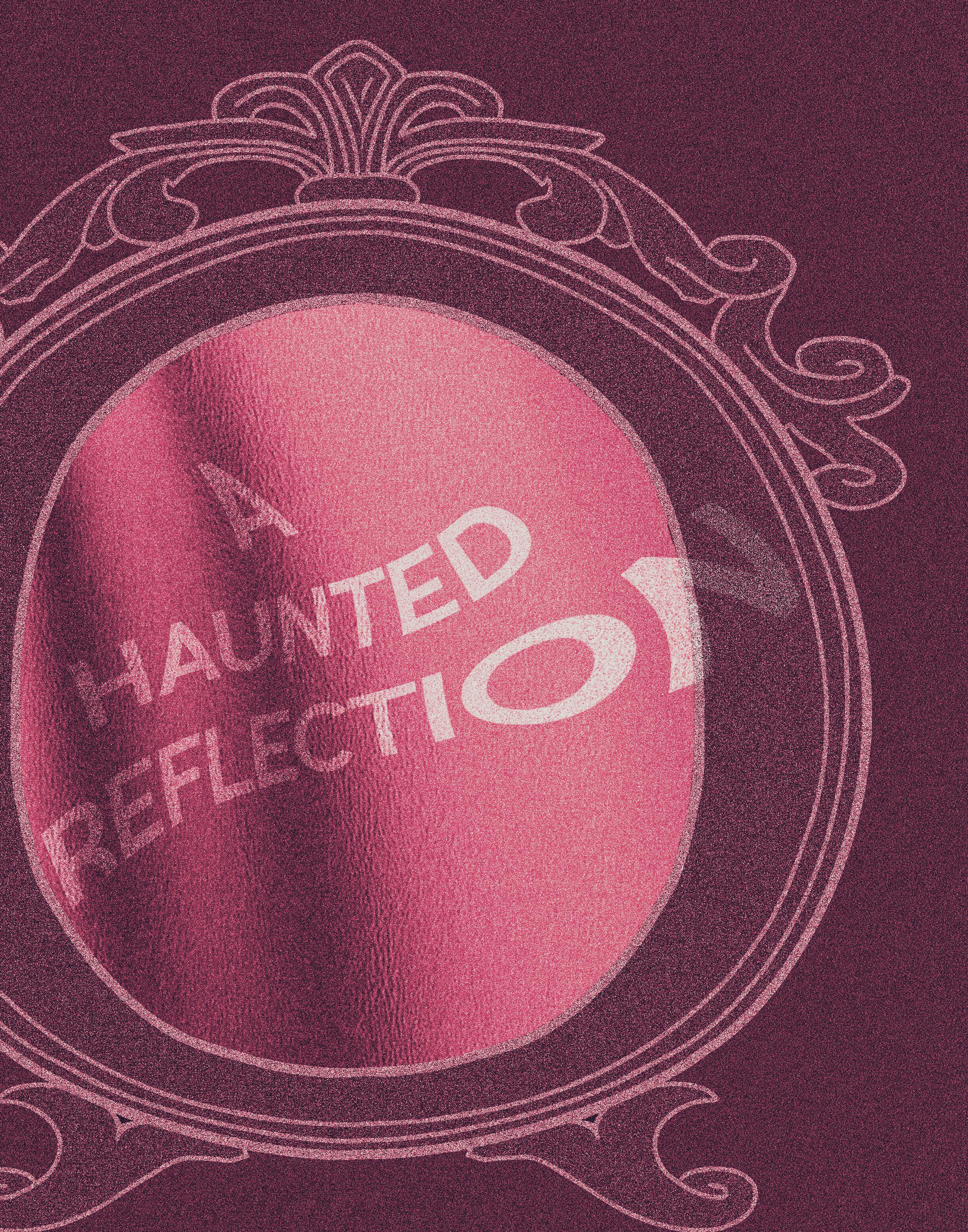 Written by Chloe Wetzler
Illustrations by Ella Dopke
Design by Christine Jung
Written by Chloe Wetzler
Illustrations by Ella Dopke
Design by Christine Jung

’m not sure when my mind and body disconnected, but it must have been sometime in late July when I taped over my mirrors with parchment paper. I couldn’t look at my reflection without being reminded of him. Somehow, the small of my back, the dip in my hips, the slope of my spine all brought my mind back to his memory. The body that had always been mine he suddenly seemed to lay claim over. And so as to move on, I disconnected from it.
I noticed the detachment a few weeks later as a different man peeled off my clothes. My body language, stiff and withdrawn, told him everything my mouth wasn’t, but he paid it no mind. Like a lion to an antelope, he brutishly clawed at me, moving quickly so I wouldn’t have time to say no. He was eager to enjoy his feast after the hunt.
I knew what he was doing was wrong, but my lips stayed sealed. In previous years, I would have scratched and clawed; bitten and spit; ripped his hair from his skull; screamed with everything in my lungs. But that night, I lacked the instinct to defend my body. It felt like it was just as much my body as it was his. That night is logged in my memory from the third-person perspective, as if I was an observer rather than the victim.
A week later, in an unfiltered stream of consciousness, I revealed to my therapist that, to my understanding, my body was going through a meta-


morphosis in which I had shed from my body and now lived outside of it. Through furrowed brows, she opened her file cabinet without a word and pulled out a printed infographic. Sliding the paper towards me, she tapped her finger along the bolded title. “Depersonalization disorder.”
She must have misunderstood what I was saying. I explained to her that this wasn’t a problem that needed fixing. I felt so much better about the break-up—in fact, I almost felt nothing at all. In my attempted reassurance, my therapist’s diagnosis solidified.
I returned to school, made new friends, and went on a couple of first dates. But something was still wrong. My so-called metamorphosis turned sour. Anxiety attacks, the sudden urge to articulate how everything felt, my Lorazepam prescription exhausted in record time, my life one big haze. I still cannot identify with this time in my life – it feels like a season of a TV show I watched, rather than lived.
I’m not sure when my body and mind reunited, but I do remember when our reunion was brought to my attention. On a cold December morning, as I walked past his work, I saw him sitting in the front window. My reflection superimposed over him, leaving me to stare simultaneously at myself and at him as I walked by. My mind in the months prior would’ve considered this a prophetic metaphor, telling me that we were still one, soul-tied. But what I noticed then was I saw myself in my reflection. The reflection I had been seeing, one of a girl I couldn’t associate with – my shadow, my twin, my clone who had haunted every mirror I’d looked into in the past four months– was gone.
 Shoot Director Amelia Raden Jackie Wang
Graphic Design
Christine Jung Arianna Shekhani
Hana Rust
Carolyn Tang
Photography
Peyton Moore
Zoe Pessin
Jackie Wang Featuring Genevieve Larsen
Vivienne Larsen
Shoot Director Amelia Raden Jackie Wang
Graphic Design
Christine Jung Arianna Shekhani
Hana Rust
Carolyn Tang
Photography
Peyton Moore
Zoe Pessin
Jackie Wang Featuring Genevieve Larsen
Vivienne Larsen
Tess Vogel
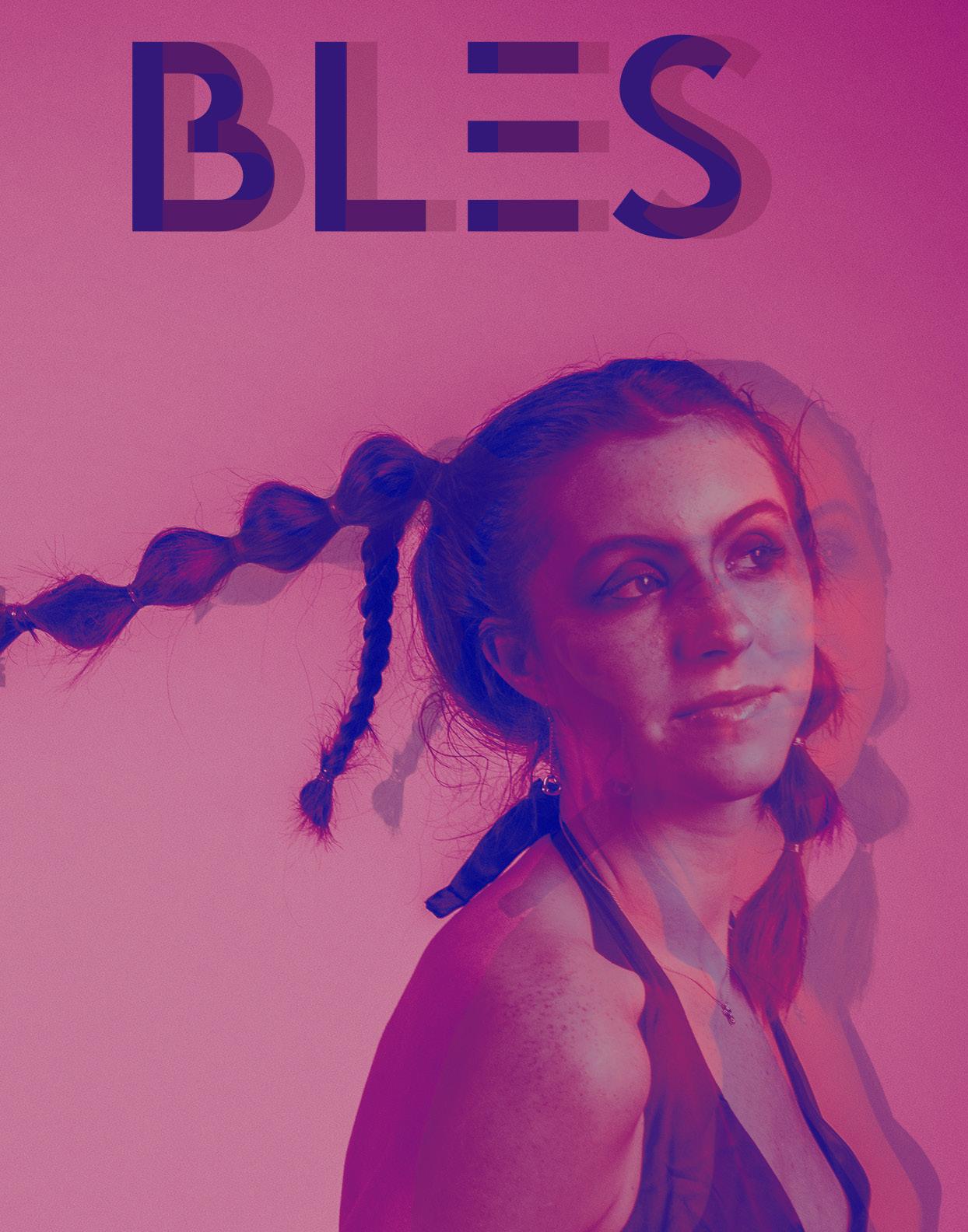
Stylist
Tenzing Dekyong
Tatum Goforth
Evelyn Pae
Amelia Raden
Faheem Rahman
Josie Zimmerman
Hair & MAkeup
Olivia Slemmer
Jasmin Wu
Featuring
Abby Peterson
Julia Peterson
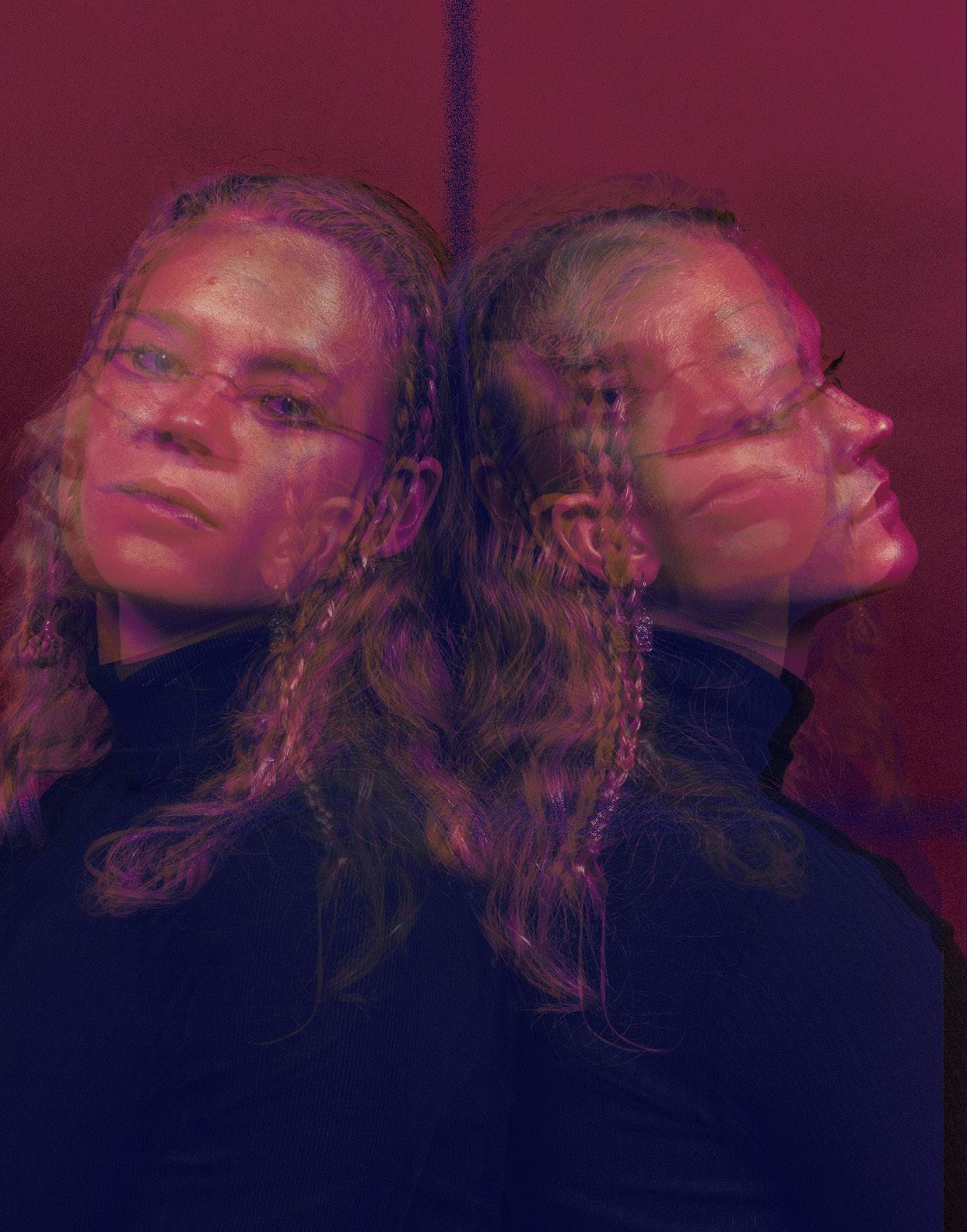

When I was growing up, I was always compared to the moon—soft and sensitive, and less bright than others. To see the moon you have to make your way outside at night, in the cold or in the snow and look for it. It’s hardly ever full and often not bright enough to illuminate even ten feet ahead of you. For someone to see the moon, they have to really want to.
It made sense to everyone, though. Since she was the sun, I was the moon. Her face was the same as mine, the marks on the doorframe tracking our height were always overlapping, the wisps of our hair thickened in all the same places, but, to others, she glowed brighter. If I was the moon and she was the sun, then we made a perfect pair, soulmates set to be each other’s other halves from cradle to grave. She was the color pink and I was purple, she was gold and I was silver, she was the singer, and I the writer.
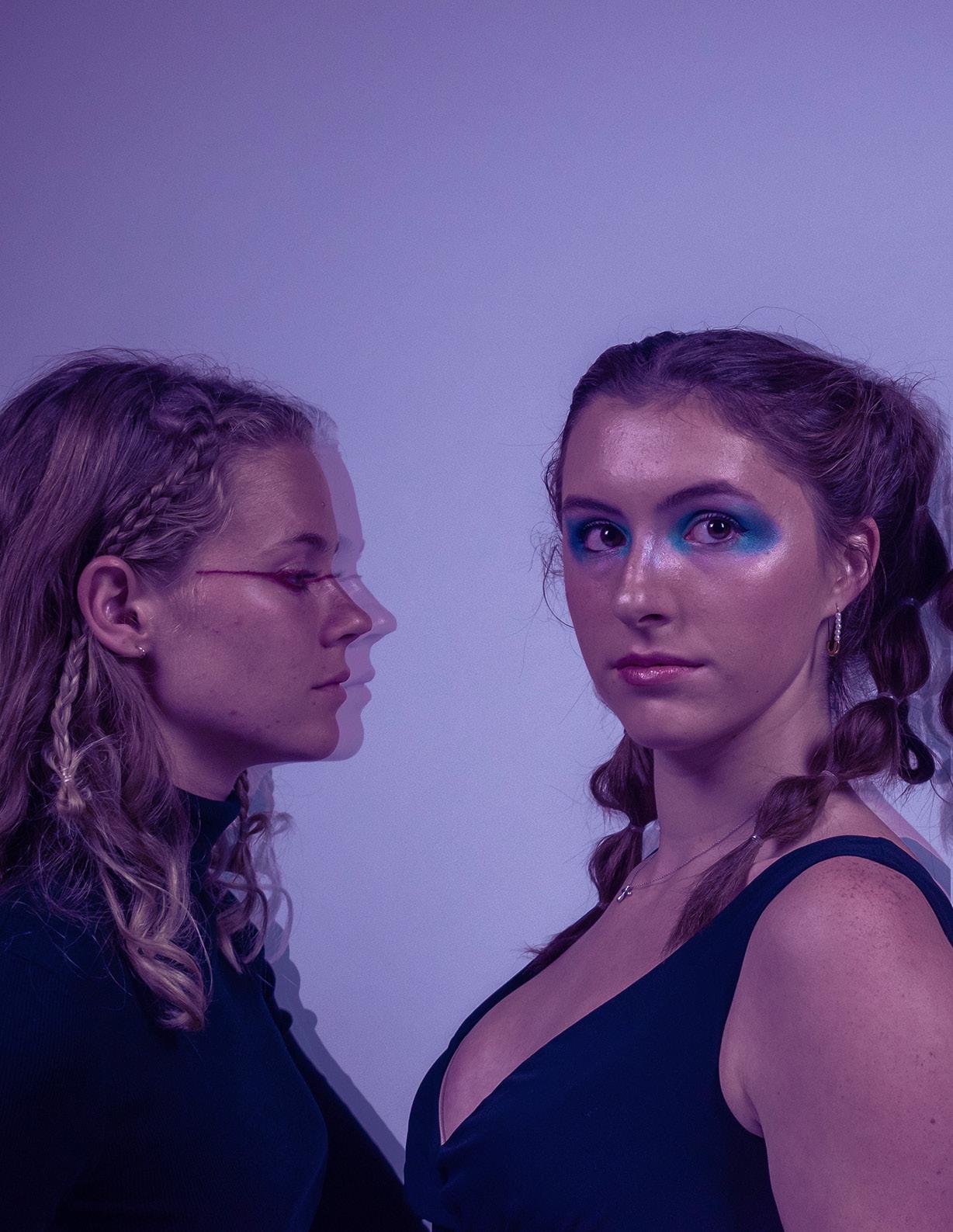
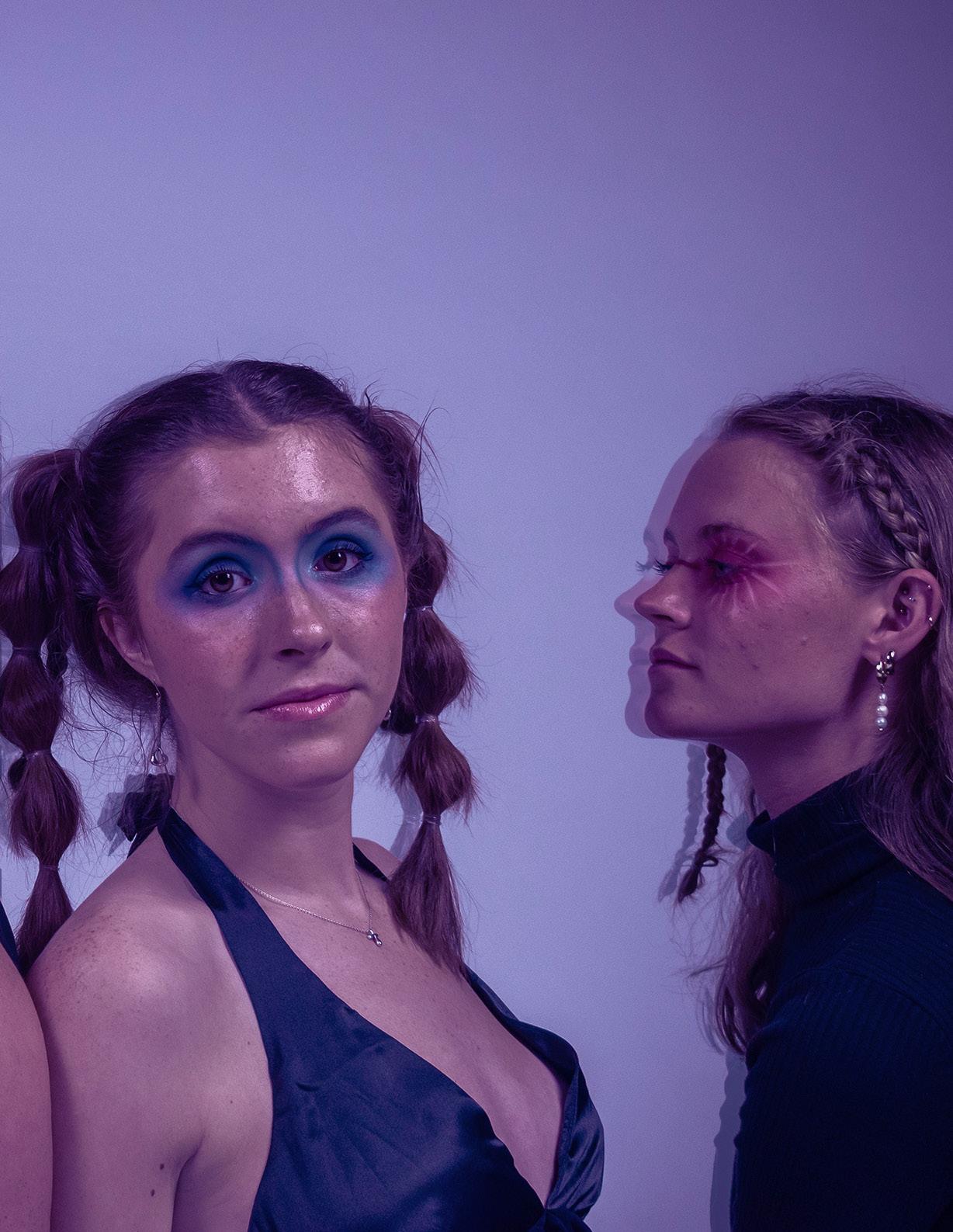

As I walk downtown, her face follows me, plastered on benches, taxis, and billboards . One time, I stood right by her sign at the bus stop and waited to see if anyone would approach me to ask for a picture. I wanted to be mistaken for her, just once. I waited for a few minutes, then a couple of more, and more, and the time dragged on but nobody stopped. I stood there until the sun fell behind the buildings and I felt like I just might burn the whole stop down. I guess strangers on the streets who hardly gave me half a glance could tell in an instant that I wasn’t like the sun—I didn’t have what she did.


I spend a lot of time in my apartment looking in the mirror. I stare at my face, making micro expressions and memorizing the lines around my mouth that are just beginning to form. I run my fingers over my cheekbones to feel their shape, and I look into my own eyes for my achilles heel, whatever it is that separates me from her – whatever separates mere mortal from invincible. I tape a picture of her beside the glass. She is posed with her hands holding up her hair, a warm smile across her face. I look between my face and hers, contorting mine to match her expression. Our faces should be identical – that’s what science tells us – but no matter how much I practice, I swear I can never match the tiny lines that form around her eyes when she smiles.
I write a lot too, hunched over at a little desk that is cramped into the corner of my living room. I can never get comfortable sitting there, no matter how much I fidget. I hide behind my computer screen to avoid looking at the mess in the room— tissues and crumpled photographs on the coffee table, pages torn out from magazines strewn across the floor, and stains from coffee and wine on the beige rug. I used to leave the TV on, and sometimes the radio, too, just to fill up the empty space with some noise. It’s maddening, really, to hear your own voice ricocheting off the television screen on late night talk shows, each sentence of the familiar intonation a bullet, while you sit painfully balanced in a decaying chair.
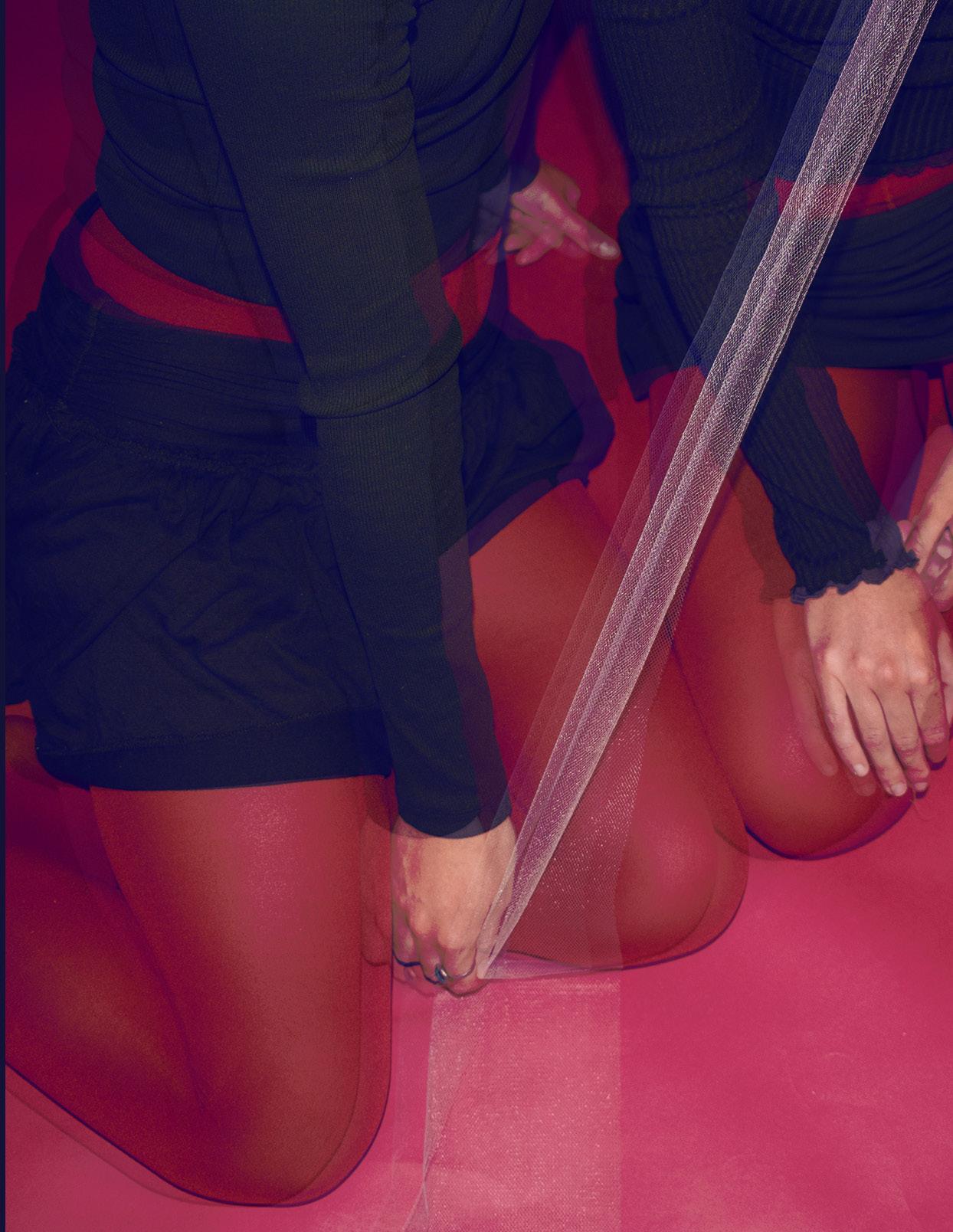
Our faces should be Identical.
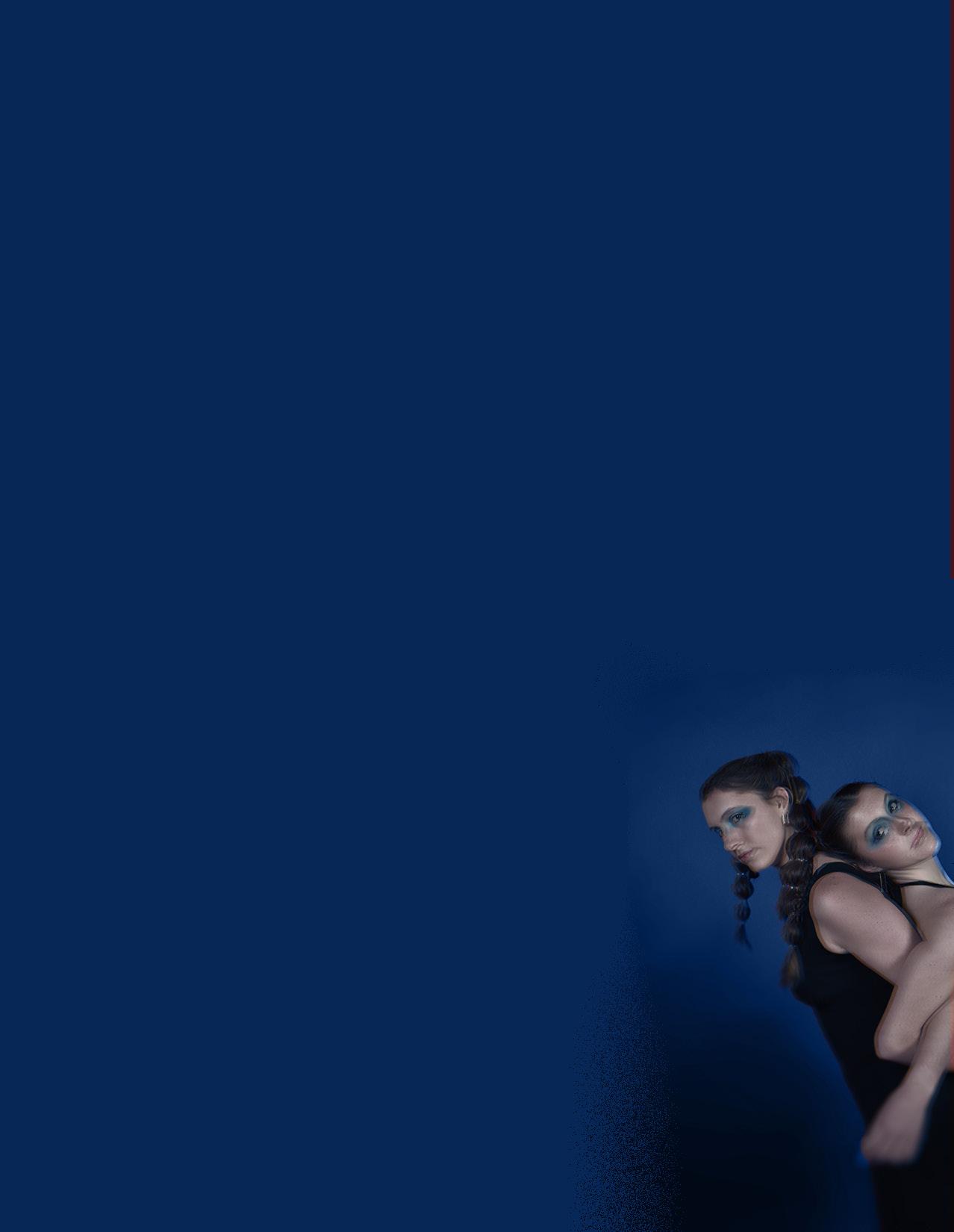
One night she appeared on the screen in a long, yellow gown. I noticed because the glow from the television lit up my living room - the sun isn’t supposed to shine at night. From forehead to feet, all of the muscles of my body tensed at the illumination of the room. She was sitting in a beautiful armchair and smiling on the television screen, and her picture taped on the mirror was smiling at me out of the corner of my eye, and suddenly before I knew what I was doing I hurled my mug at the screen as hard as I could, shattering the image. I watched the fragments of glass fall to the floor as the television sputtered and went dark. I could hardly look at the scene. I turned and stared into the bare darkness beyond the window, searching for even the slightest hint of white light, something more beautiful than her in a yellow dress, but the sky above me was blank.
The thing about the moon is that, no matter whether it shines or not, it exists in the darkness. I sat in the apartment that night with no light, and the next time I went down to the bus stop I decided to try yellow.
